#I’m debating on if I post it
Explore tagged Tumblr posts
Text
I just wrote the most heartbreaking tiny snippet of season four jon dealing with hunger.
And I have no idea where that came from but I am crying now so that’s fun.
#I’m debating on if I post it#I never think of season four jon#where the heck did this come from#it’s cute jon and Daisy friend moment#and I wanna cry over it#tma#the magnus archives#the magnus institute#magnuspod#jonathan sims#the archivist#the eye#daisy tonner#alive tonner
57 notes
·
View notes
Text
Here’s my take on the whole audio books vs. reading:
Oral tradition of storytelling predates written ones by millennias, and honestly, which one you like is just a personal preference.
The actual difference is
when listening, you have no idea how to write characters’ names
when reading, you have no idea how to pronounce characters’ names
hope this helps!
#audio books vs reading#honestly this debate is just pineapple on pizza again#personally i like reading better#i’m a poor listener and since i read faster than people talk i get bored and my mind starts to wander#but who gives a shit#just do what works best for you#in the end we all get the same story#oh and this post is about stories in english#in finnish you rarely have either problem
27K notes
·
View notes
Text
They don’t even attempt to assassinate US politicians anymore. You notice that? Not since the anthrax scare back for… who was it, Barack? And even that… pathetic. This new generation has no respect for an honest hitman. I’m not sure this new generation has any honest hitman - you see that shit with Boeing? Sloppy, fucking disgraceful - you kill the whistleblowers before they get halfway to a lawsuit. What kind of fucking amateur is doing faked suicides the night before testimony? Goddamn greenhorns. Back in my day someone tried to shoot Ronald Reagan in broad daylight. There used to be bomb threats to Congress. I took out a few union leaders in the utilities sector myself. Today’s generation? Won’t even threaten to throw a punch - not even over on that - what’s it now, ‘X’? They got no guts. None! And they don’t even have poor impulse control to boot! Too much of that - that panopticon anxiety bullshit. “Oh what if I get a called out post???” People used to send the president letters full of bioweapons. In the mail! Today’s generation? Not a chance. All because of woke.
#ra speaks#personal#JOKING.#this is a joke this is a parody of right wing rants regarding social phenomenon they believe to be oppressed by left leaning politics.#but within the perspective of an old fictional hitman.#this is a joke tangentially referencing my fictional hitmen from a fictional story in which no harm comes to career politicians#obviously but also if this gets me on a list o7#fbi agent in my phone I’m a disabled autistic dyke with zero engineering or chemistry background#my skills are best applied to…idk sabatoging national forest harvest regimes? but I’m not doing that they’re neglected enough as is.#edit: oops this is getting notes o/ hiiiii cia agent reading this post <3 a union leader my dad worked w got fucking assassinated#by Pinkertons and y’all didn’t do shit. I hope you have visions of hell and become a nomadic hermit self flagellating in the woods#edit 2: ooooooh there was a pres debate last night. that’s why people care about my two week old joke hitman post. was wondering why.
3K notes
·
View notes
Text
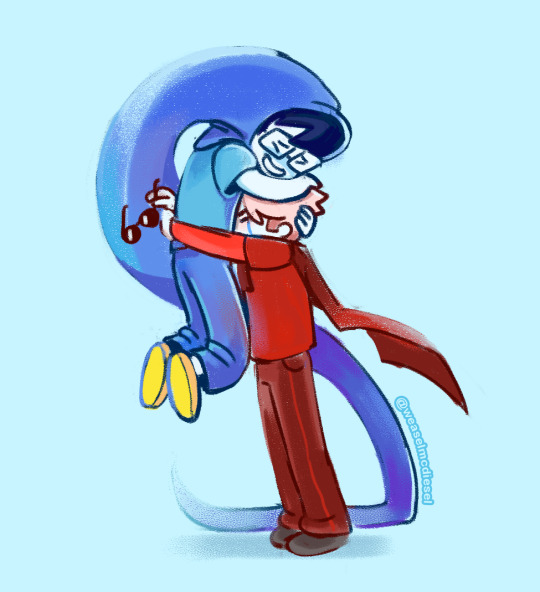
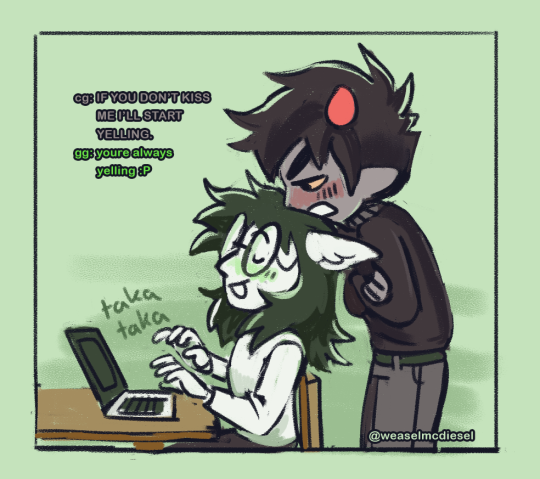




requests for a bunch of ships i did on my spam :3
#my art#fan art#homestuck#sadly i gotta flood tags for my own organization OTL#john egbert#jade harley#dave strider#roxy lalonde#eridan#eridan ampora#sollux#sollux captor#nepeta#nepeta leijon#terezi#terezi pyrope#karkat#karkat vantas#johndave#jadekat#gamtav#eriroxy#solnep#neprezi#gamzee makara#gamzee#tavros#tavros nitram#I actually ended up not liking some of these and I’m debating posting it to my main#but eh. ehhhh ehhhhhh
5K notes
·
View notes
Text
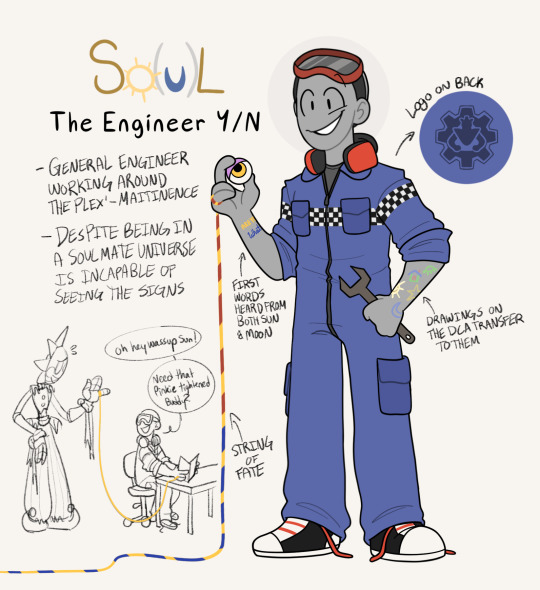
The base Y/N design for my soulmate AU!!
#my art#sun#fnaf#au#so(u)l#fnaf security breach#dca#daycare attendant#parts n service#parts and service#y/n#y/n design#I’m debating just posting the fanfic on tumblr until I can get an A03 up then just editing the posts to link to the ao3 later on… I think#that’s what I’m gonna do#teehee anyways cringe is dead#so(u)l art
5K notes
·
View notes
Text

Kinger does NOT want a new wife….. yet…… here is the obligatory second wife comic slop!
#the amazing digital circus#tadc caine#tdac#tadc fanart#caine x kinger#kinger x caine#royalteeth#tdac kinger#kinger#kinger fanart#kingleader#hey YOU!#yes YOU reading the tags#I just made another comic and I’m debating to post it#even though I only post one a day#I’m debating because it’s fire#so if you wanna see that then say something I guess#tdac comic
1K notes
·
View notes
Text

I needed to doodle something sickeningly sweet before I go to bed. Fucgingh tired
#my art#digital art#doodles#tbh was debating on if I should post this or not#Well I’m here now so#sonic the hedgehog#sonic#sth#sonic fanart#sonic the hedgehog fanart#shadow the hedgehog#shadow#shadow the hedgehog fanart#shadow the ultimate lifeform#sonic x shadow#sonic x shadow generations#shadow x sonic#sonadow#sonadow fanart#Anthro
601 notes
·
View notes
Text
the debate may be over, but the thought experiment lingers in my heart… walrus fairy save me… please knock on my door…
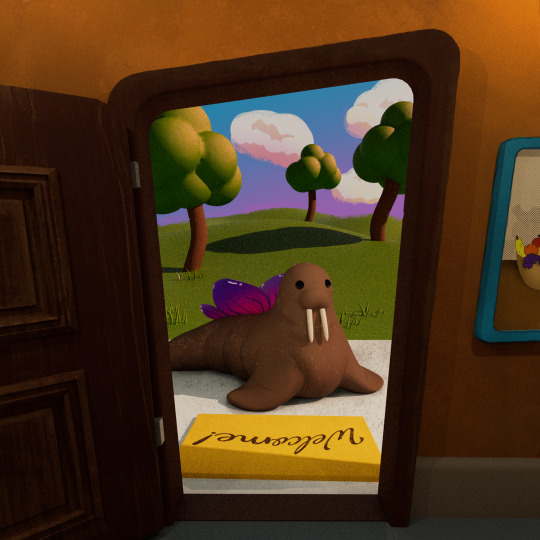
#walrus#fairy#walrus vs fairy#fairy vs walrus#the debate of the year#my art#blender#blender3d#my post#hehe if you’re seeing me reupload this cuz it only got 30 notes#no you didn’t#fairycore#baddywronglegs#last time I tagged baddywronglegs and they didn’t see it so now I’m too cowardly to tag them again#if you read this far: why?
663 notes
·
View notes
Text
Chilchuck’s wife and family - Facts, theories and headcanons
I want to keep this as a sort of masterpost on Chil’s family situation if I can, but if we get a lot of information on it (in the additional content that Kui is gonna make) that renders this more or less useless I probably won’t update this anymore. If you find other crumbs of information or I've said anything factually incorrect please do tell me! I'm planning to edit this as we go since I want to compile most if not all of the information and pages we get about this topic on here, and if I just wait to post it perfection paralysis will nip this in the bud. It focuses a lot on Chilchuck and Chilchuck's wife relationships, but the daughters and Chilchuck's own parents and siblings are talked about as well.
CW/disclaimer: This post talks about messy family dynamics and such, there’s no outright abuse I’m implying anywhere, but alcoholism and neglect are mentioned and discussed. I’m not here to demonize anyone! I love every character involved and I just want to theorize about the topic as a layered issue that involves complex characters. Also, I try to use very transparent language as to when I’m citing or analyzing canon information and when I’m giving a personal interpretation or headcanoning.
Abbreviated table of content:
Timeline and circumstances
Possible strains on the marriage
The hair question. Confirmation on what his wife looks like?
Other family dynamic & post-canon theories & headcanons
Parenting style + misc in a reblog addition (new)
Let’s start with the facts, shall we?
Timeline and circumstances

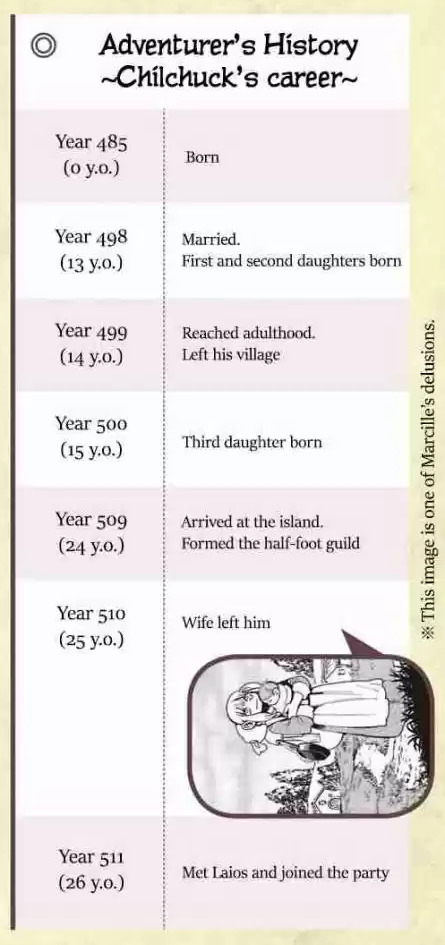
So, we see that Chilchuck and his wife are childhood friends, and they married at 13 years old and had two children in that same year. Since half-foots reach the age of maturity at 14, they seem to be what we'd call teen parents. It's a bit debatable though, since Laios says the age of maturity for tallmen (humans) is 16 instead of 18 or even 21, so what's considered to be the age of maturity is a cultural thing and isn't fully reliable when we want to compare to our irl understanding and what developmental stage it perfectly aligns with. Also, during the succubus chapter Chichuck says that his daughters were all now of age to be independent, and Chilchuck's wife leaves to live with Flertom, which would mean that Puckpatti was independent at age 10 and lived away from home as well (since she's the third/last daughter). Ah yes another interesting thing to note is that we don’t know the pregnancy periods for the races, since Meijack and Flertom were born the same year. It could be tight timing or it could be something else, but I don’t think they’re twins, they keep talking about them being the oldest and the middle child, them being twins is definitely the sort of thing that would get mentioned.
Him starting working on the island notably happens just one year before his wife leaves him. I don't remember the other instances of him mentioning it though I feel like it happened, but since he started working at the Island's dungeon, working as a dungeon diver and then forming the half-foot guild, that probably means he started being away for longer periods of time and having a less reliable schedule on when he'd be coming back home. It is said that he went back home somewhat regularly iirc, though he usually ends up sleeping at the half-foot guild quarters. I'm not sure if Kahka Brud is also where he lived with his family, or just since he rented someplace new after she left him. He and his timeline state that he was born in a small village "northeast of the island", which he left at 14 one year after being married, but it isn’t stated where they go after so it’s unsure how far his home was from the island if it wasn’t in Kahka Brud. We don’t know when his father died so if that factors in to him leaving his village we have no clue.
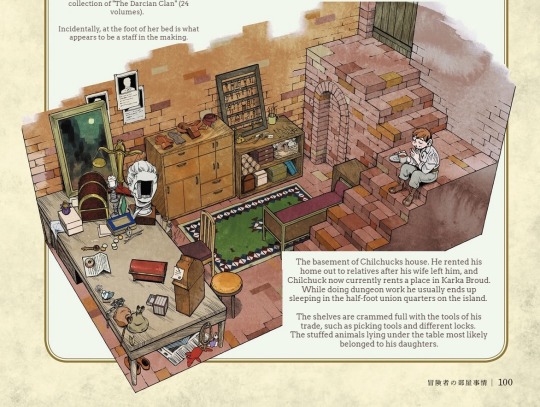
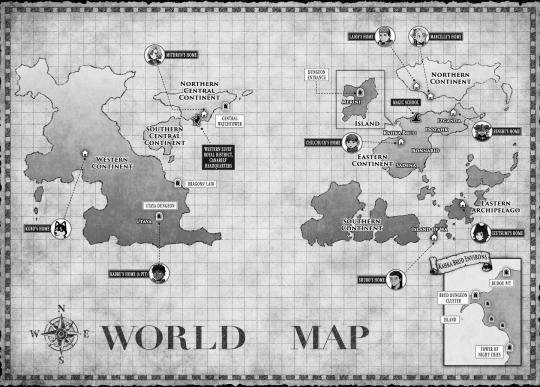
Chil also says that he hasn’t seen or spoken with his wife nor daughters since the incident, which would mean he's gone 4 years without contact with his family during the events of canon. I don't remember if Chilchuck is said to exchange letters with his daughters, beyond the initial one from Flertom saying her mother was with her, so I've been assuming he hasn't.
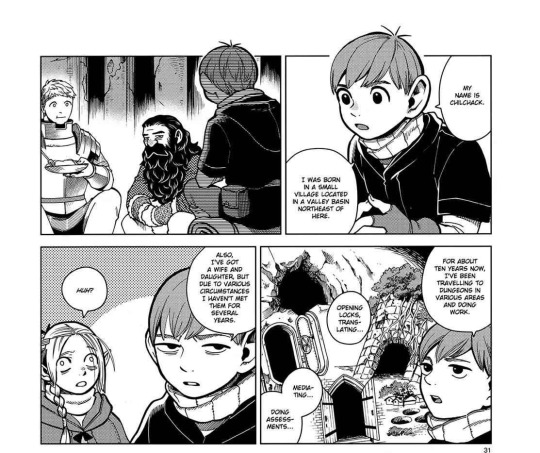
He also says "For about ten years I’ve been travelling to dungeons in various areas and doing work" which considering he’s turning 29 that year would mean he started around 19 years old? The panel also gives details what sort of work he’s been doing. Either way it’s confirmed that Chilchuck travels for his work a lot.
In addition, since Chilchuck has the seal of approval of the bicorn + says so himself, he has always stayed faithful to his wife. So that means that unless he's had previous adventures before he was 14 and got married, he's never dated anyone else in his life, nor had romantic or sexual encounters/experiences with others in his 16 years of marriage right up to canon (year 514). I feel it’s safe to say that it’s implied that during all these years starting from when they were married, Chilchuck's wife was a housewife whose main job was taking care of the kids and the house.
Marcille's take on what happened is unreliable, as Kui even takes the time to directly say so in the Adventurer's Bible, so I don't want to use it as a baseline even if it offers some insight on what could have happened (her feeling out of place, leaving to test his love, etc etc).
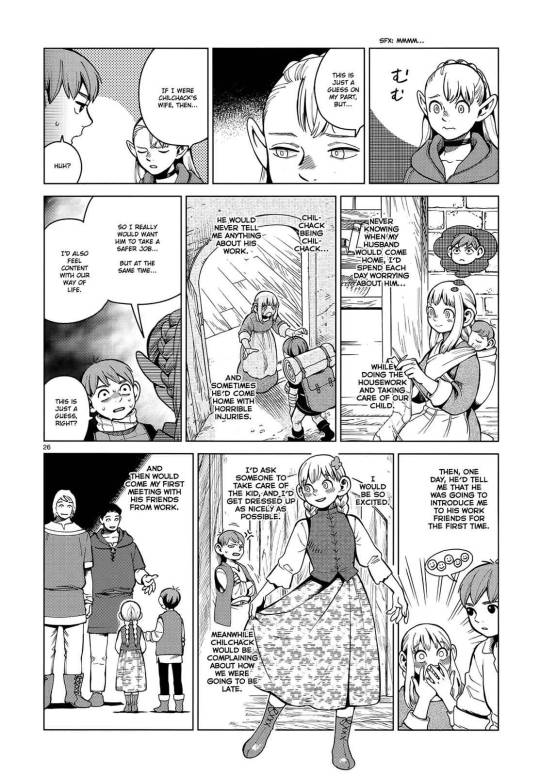
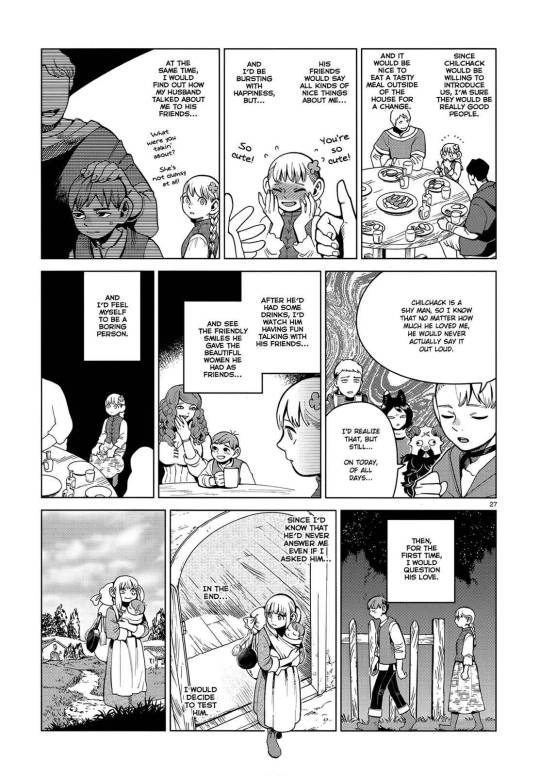
What Chilchuck says seems to be accurate though since it pertains to his perspective of the events! Unlike how Marcille's theory flows, Chilchuck was aware that something was off before she left since she "suddenly fell into a bad mood".
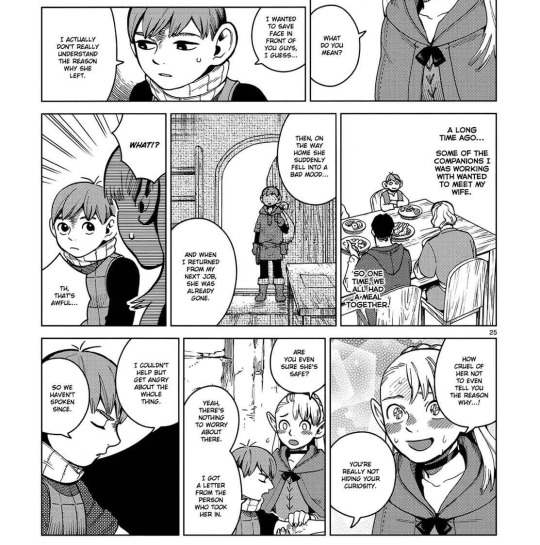
Piecing everything together, my theory: Chilchuck and his wife were childhood friends and have always always sort of danced around of each other, the classic movie love story with childhood sweethearts, until they ultimately confessed and got together. While dating, Chilchuck's wife becomes pregnant and they're both unequiped to deal with the situation but decide to marry, either a bit forced in order to cover it up or hopeful to make the best of it. They make it work as they can and Chilchuck works to provide for the family while she takes care of the home and the kids, which means that even though he's not a deadbeat father (he cares, he was at least a bit involved in their lives and raising them since for example he knows how to braid hair after all) he ends up being rather absent from home. It only gets worse over the years, especially when Chilchuck starts working further and further away from home and coming home less often, and since Puckpatti left home Chilchuck's wife is alone at home most of the time, never knowing when Chilchuck would be coming and if to prepare the table for two instead of one, or even if he'd be coming back at all since his work is dangerous. The humdrum and lifestyle would get to her, they've grown into different people in these 10 years of marriage and she doesn't feel the spark or feels valued & seen anymore, so she leaves. He feels confused and betrayed which turns into anger so he doesn’t try to reach out and mend things, and with the way he says they’re estranged and he moves away I think he’s avoiding his family somewhat.
Possible strains on the marriage
Tfw all your daughters are independent and your husband is gone to work almost all the time and he barely even tells you that he loves you, is there even a reason to stay together anymore? Every day it’s just you and an empty house and chores to do, wondering if you have to cook for one or for two today.
Alright it’s analysis and theorizing time! Although there are more facts down in this post if you care about Chilchuck's wife's appearajce, Chilchuck's parents & siblings or the kids, the essential facts so to speak were all in the first part.
We don't see Chilchuck showing any discontent with his wife through the manga so I'm assuming that he was content in his marriage, happy with his wife, and with how he stayed faithful to her even in the 4 years after she left (and never stopped calling her his wife. Which also shows a weird stubborn attitude since he wasn’t planning on reaching out to her and mend things but I’ll put aside the possible entitlement/coping mechanism for another time) I think he truly loved her and still does. Since she left him and not the reverse, I'm putting a lot of emphasis on his wife's side of things. Especially since we do see how Chilchuck is at work quite a bit but never see how he is at home. I’ll be sounding harsh towards Chil on this but he’s pretty much the only party we can criticize since we don’t know her, I still side with Chil on the leaving issue though, he’s justifiably pissed if she left without a word what the hell even.
Alcoholism and health
Chilchuck’s favorite food as listed in the Adventurer’s Bible is beer, and it’s shown that he’s prone to drinking until drunk whenever he gets the opportunity to. A cheerful drunk is still a drunk. (Extra reading: if interested here's a oneshot FMA fanfic by a friend that goes in depth about this very topic that really illustrates what sort of family dynamic that can bring about. It’s not dunmeshi but it’s a good read.) Chilchuck is also canonically underweight, starving himself for a strict weight management diet (Extra reading: you can look at a short compilation post about that here). Did you know under eating makes one irritable? And this is on top of Chilchuck sometimes/regularly coming back home with "horrible injuries", since Marcille guesses it and he acts like she’s dead right on everything that far.
It’s rough seeing someone you love mistreat themselves, not being able to shake them out of that and having to stay to see them wasting away. It’s rough seeing them put their work above their own health. Putting their work even above their family. Putting alcohol over family time. It's not that simple, but there's always that element when asking someone you love to tone it down with things like alcohol or such, that if they refuse, then it feels like they value that thing more than they value your feelings or opinions. That they love alcohol more than they love you.
You know how there’s often this thing of "Well I’m providing everything for this family, so whatever else that I do you don’t get to complain." I do think that it’s something they’d have argued over a little bit, not that he’d say it that way, but the essence of it. "Chilchuck, you’re drinking a lot of alcohol often, I’m worried maybe you should ease up on it." "This is what I want to do in my free time, give me a break.", "Dear, your mood gets worse when you’re hungry, I really think you should stop dieting-" "Would you rather I die in a trap because I was too heavy?", "Honey I don’t like when you work so far away from home for so long" "Well what else can I do, do you have any better idea?". That sort of thing. Even if not being passive agressive or snappy, or even spoken upon, these situations can cause tension, or a feeling of powerlessness or imbalance in the relationship. Although I personally feel like they were both rather passive in their relationship (thus having little arguments), which itself can be a problem since yes they let each other live but they grew more distant and less communicative as a result, more on that later. Content and tolerating, rather than happy and fulfilled.
Workaholism and long distance
Spending a lot (or even a majority?) of time away from home for years and years obviously can strain relationships in many ways. Besides becoming more distant, both with his wife and his daughters, there's just that side that maybe you grow apart or you end up not knowing them all that well. Like the fictional dialogue excerpts I wrote just above, the way Chilchuck puts work above most things can by itself be the source of a lot of unhealthy habits and strains that could not only hurt himself but his relationships too. Devoted doesn’t mean attentive, even if Chilchuck 100% devotes himself to only her romantically and works in the goal to support her that doesn’t transfer into being there for her, even when he physically is.
An absent father isn't necessarily a deadbeat father, but an absent father is absent. And alright, we don’t know what his schedule was like exactly, but he was busy and traveled around, I think it’s fair to assume that if we were to make comparisons it’d be like parents irl who are often on work trips. We don't know what Chilchuck's wife's social circle is like, but regardless of how big or small or supportive it is it would be easy to get lonely I think. Besides raising the kids undoubtedly falling more onto her shoulders as well. Managing a household can be very hard and tiring even when not alone, I can imagine she felt like she missed the support of Chilchuck either as help or comfort oftentimes. We know very little about her, but I don't get the impression that she'd build up resentment over it except maybe her ‘falling into a bad mood’, but exhaustion? Absolutely.
It’s also implied imo, even beyond Chil not often being at home, that they rarely go out together. And that could very well be part of why she was mad after the outing. In Marcille’s theory she says that her wife felt out of place amongst all the cool adventurer coworkers, and if it’s a rare time that they go out together and it was supposed to be about her meeting his coworkers… I feel like what could have happened was that she felt out of place yes, and even moreso if she ended up not participating in conversations much because of it and no one really seemed to care, and the evening was all Chilchuck and his coworkers chatting it up as always and she was an outsider, if she sort of just faded into the background, if it felt like nothing would have changed wether she was there or not... If she felt like her presence didn’t matter on this special outing that rarely happened, it could have been the straw that broke the camel’s back for her to want to leave, definitely. He finally comes back after a long work travel and they finally go out and this is what their quality time is like? The outing that was supposed to be about her & them both ended up being all about him, and once more she was supposed to just orbit around him and his life without complaint or her own selfish wants like a devoted wife. With how Chil said that she got mad "all of a sudden" on the way home and he didn’t know why, plus that he was probably drunk (which may very well have made the whole thing worse), I feel like it supports that he didn’t pay her much attention during the evening, not that I’m assigning him ill intent at all, I’m sure that for him, it was a casual and fun night out and he didn’t think it'd been unpleasant or alienating for her.
That night
And all of this speculation in order to try and figure… What happened? Why did she leave? I've already gone into it a fair bit, but this is where I discuss it fully in depth.
We can’t rely on Marcille’s theory. Neither in the why she felt so out of place enough to want to leave, nor if her intention when leaving was to "test" him. I definitely agree that the reason why she left is layered and that the night/outing was the straw that broke the camel’s back more than the cause perse, but besides that it’s hard to say how much of it was impulsive and how much was because nothing else had worked to fix their relationship, or how long she'd been thinking of maybe leaving him.
Personally my favorite interpretation isn't that she found herself to be boring surrounded with Chilchuck's adventurer coworkers, or her reason for leaving is super centered around insecurity and if Chilchuck even loves her anymore, but that she sees how rich and eventful Chilchuck's life is and at the same time realizes how stagnant her own life has been. Chilchuck has adventurers for coworkers and they go out to bars and spend evenings together chatting it up, while she always does the same house chores every day and waits, and wonders, uncertain about when her huband would come back, and waits some more. She has a sort of passive role in her own life that gets pulled in one way or another by the people around her at their whims and needs, which is also a recurring theme in the manga: having a passive role in your own life, or a role that's devoted to others. Like with Falin who's always following her parents' directives or following Laios around, being the party's healer and eventually sacrificing herself for Laios and Marcille (she also doesn't seem to think much of marriage, as seen with Shuro proposing to her and her not having answered yet, which fits with how she was supposed to have an arranged marriage in her hometown too; a loveless marriage isn't something alarming to her). Izutsumi too, whose whole arc is about her gaining freedom and figuring out how to use this empowerment for herself and what she wants.
So she'd sit there, not knowing anyone except Chilchuck and not being able to follow their conversations about dungeons, and think about how this is a world she's totally apart from. How she knows so little of the world compared to him. She'd realize that while she's always waiting for Chilchuck to come home, dedicated to him and their family, Chilchuck's world doesn't stop and end at where and when he sees her, that while she's waiting he's living and experiencing things and being self-fulfilled. She's so passive and devoted and her tasks seem almost senseless now that the house is empty except for her, and in that time he's formed half-foot unions and she understands so little of what his life has become outside of her sight. This isn't a diss on Chilchuck or his attitude, I just think that it'd make her ponder about happiness and lifestyles, what's worth it and if she's content with her life. I think she'd find that her and Chilchuck aren't on the same page anymore, and probably they don't communicate much or even that they don't know how to communicate with each other anymore.
Other factors
They really do seem to be on different pages and not know how to communicate with each other well, since for example Chilchuck thinks that on the way back home she "suddenly" fell into a bad mood and seemingly left it alone, or otherwise they didn't talk until he knew what was wrong. Or like how she left and Chilchuck never reached out to her to talk or mend things, just like she never reached out either. According to Marcille it could be that she wanted to "test his love" and see if he'd even care if she was gone, but Chilchuck just got angry that she left like that and never reached out to her, so if that's true they definitely have incompatible expectations or ways to deal with things like that. Maybe she thought of leaving as something he should react to by trying to win her back, but Chilchuck did nothing and let her do her thing, and tbh if that were me I'd also have waited on her to reach out because I figure out that if someone leaves me they want space from me idk. He seems to be rather passive when it comes to interpersonal relationships and how they can mess up, made an analysis post here that talks about it, so the way he reacted by not reacting doesn't feel surprising, maybe she didn't know/remember that part of him, or wanted to shake him out of that tendency. He has no clue why she left, and there are just so many misunderstandings here that it's impossible to know what happened and how she felt and what she wanted for the future.
Also, we’re shown that younger Chilchuck, when he started dungeon crawling, is much more "innocent" and optimistic, less closed off on himself and bitter, and maybe he hasn't even developed his famous "sarcastic retorts" and "abusive remarks" yet as is plastered on all his character introductions and stats. Chilchuck has definitely changed a lot over the years, and some would argue not for the better. Staying with someone for so long has implications that they'll change and be different of course, but signing up for marriage with someone can still leave you questioning that choice decades down the line when they're so different
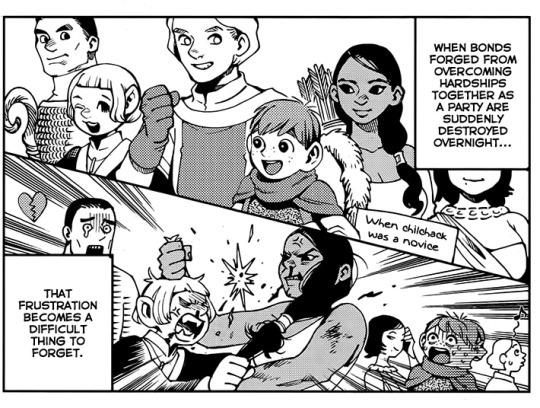

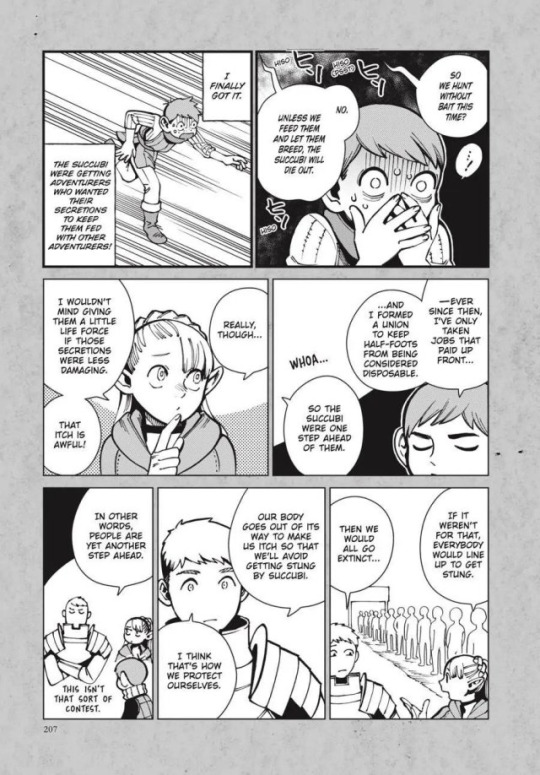
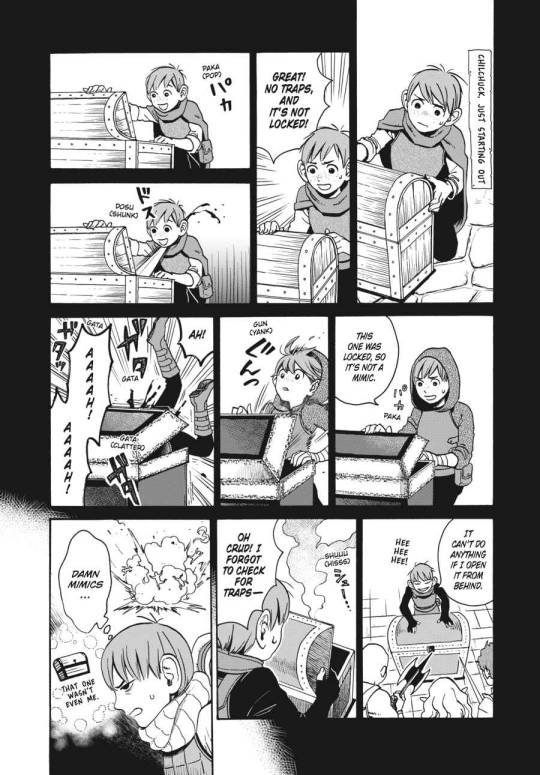
We get to see his freckles fade in sync with his corruption arc /j
Tfw when you can’t recognize the man you fell in love with.
The hair question
Edit 1/13/2024 leak!!!! Things aren’t officially confirmed but this is a safe bet. You can still read this section to see my reasoning to thinking she had black hair prior to this tho haha
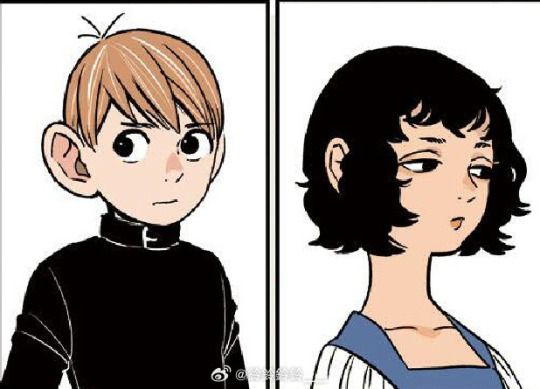
It's not all that important rationally, but the community's been split on the topic: is Chilchuck's wife blonde or not?
Kui highlights Chilchuck being attracted to blondes a grand total of three times, and many assume that his wife is blonde due to this. However, the only vision we see of Chilchuck's wife is Marcille imagining herself as a halfling, so it's up for debate! Flertom has black hair, and that's mostly been the key clue that has people arguing.
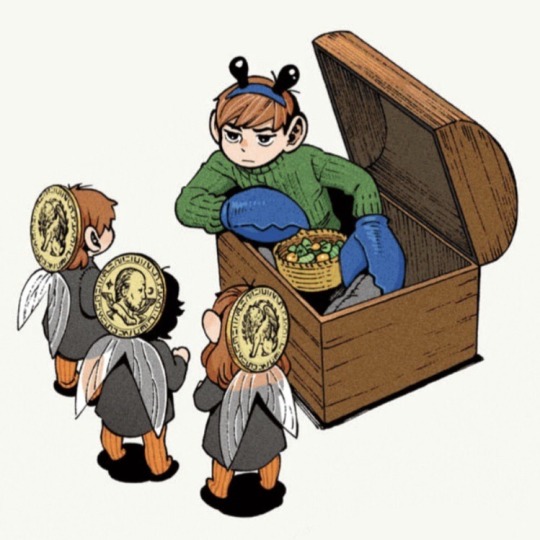
I'm not an expert in genetics but black hair is a dominant gene, but it also doesn't mean a black haired parent can't have a brown haired kid, or that two brown haired parents can't have a kid with black hair. As long as one of the parents have it in their genetic code from somewhere in their family tree, it's possible, if not maybe unlikely.
People have been taking Flertom having black hair as evidence that Chilchuck's wife has black hair, but it could be Chilchuck that has the gene and could pass it on. Although...
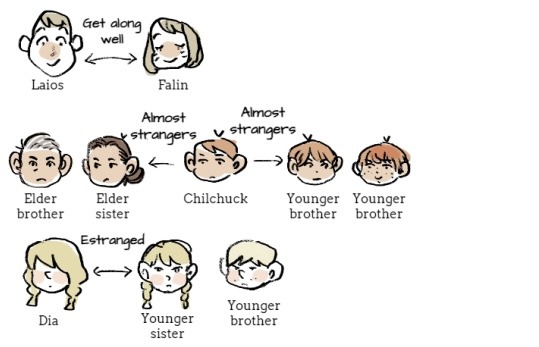
That seems unlikely. We don't know what Chilchuck's elder brother's hair color was, and his elder sister does have a darker brown hair color, but in the case their parents had black hair or the gene for it, it seems highly unlikely if not impossible for the dominant black hair gene to miss this many amount of time in the gene russian roulette game.
And so I shall now call a witness to the stand, and you reader shall be the judge… Dandan.
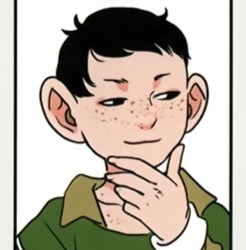
You know, this guy? He makes appearances throughout the whole manga, but only has one spoken line in an easy to brush over flashback iirc. He's most often seen hanging out around Chilchuck and other half-foots, but it's unsure how far back he and Chilchuck go.
Now. Remember how Chilchuck and his wife are childhood friends? What if, and hear me out, what if Dandan is related to her. A cousin, or a sibling. Or maybe he's Chilchuck's cousin, even, if we go the reverse route.
The chapter cover
Look at the chapter cover below! We see each member of the main party at a table that's meaningful to them and their history, mostly showing themes of family, community and routine. Laios and Falin sharing a meal by themselves, Marcille at a meal in the cafeteria at the magic academy, Senshi by himself cooking in the dungeon, Izutsumi with Inutade at the Nakamoto household, and... Chilchuck, surrounded by much more mysterious and unknown characters and surroundings.
The only face we see besides the infant is a young one on the left which strikes me as looking a ton like Chilchuck! I doubt it's Meijack or Puckpatti, or someone else, especially since Chilchuck left his hometown pretty early which must make family gatherings harder (and routine is implied with the others’ panels). If it were Meijack I think Kui would have drawn it to more closely match her too, and have her usual freckles. I also don't think it's just Chilchuck and his own family, since if that's Chilchuck the only sibling with black hair he could have is his elder brother and the infant in the middle is clearly, well an infant.
My thoughts are that the table is shared with family friends, or at least members of the community. The elderly person implies that either there's extended family or it’s a gathering, especially if Chilchuck's grandparents don't live with them. Community is implied to be very important with half-foots imo, and if Chilchuck is from a small hometown like he says that would surprise me even less. Childhood friends are often brought together as friends because of circumstances, such as proximity or their families being friends! Doesn't that kid almost off-panel on the right, with a Flertom-like hairstyle and black hair, look to be the same age as the Chilchuck on the left? 👀
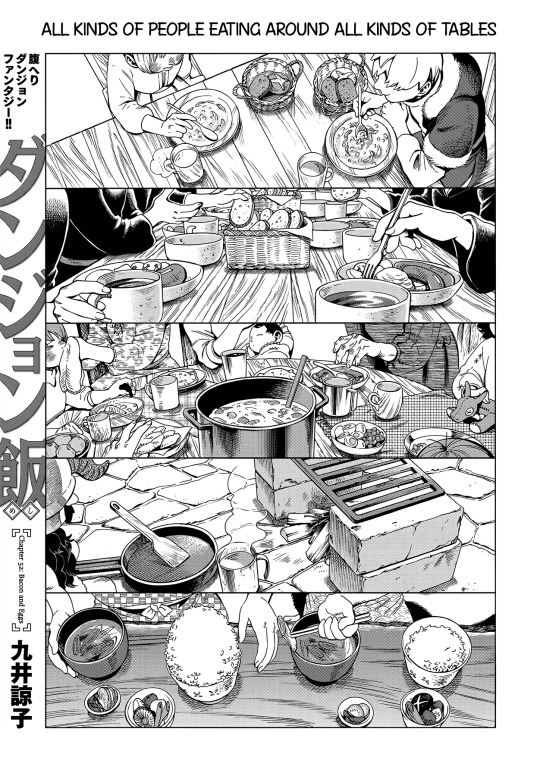
Also… Notice the dragon plush she’s holding?
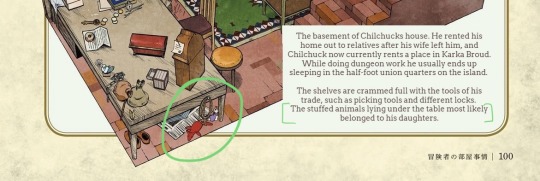

Passed down from mom to daughter? The "most likely belonged to his daughters" is interesting too
If he is related, Dandan could be the infant. I suppose he doesn't end up mattering all that much in the end if you theorize that the Flertom-like kid is his wife on its own though haha. But wether or not you think that this is convincing enough, it's all we have on the topic for now.
Ah yes! Lastly, I've seen the sentiment around that his wife should be blonde, that Chilchuck's taste for blondes, if not the thing that brought them together, should be an acquired taste from loving his wife. That if that's not the case, then Chilchuck's type being blondes is either out of place or insuting or unromantic, etc etc. I can't help but disagree! I think, especially with how Chilchuck and his wife are domestic and all about knowing each from a young age, familiarity etc etc, that it would be so sweet if she wasn't his type! Loving someone so deeply, even if they aren't an idealized type... Which is a common theme/story & character beat in Dungeon Meshi.
Family dynamic theories
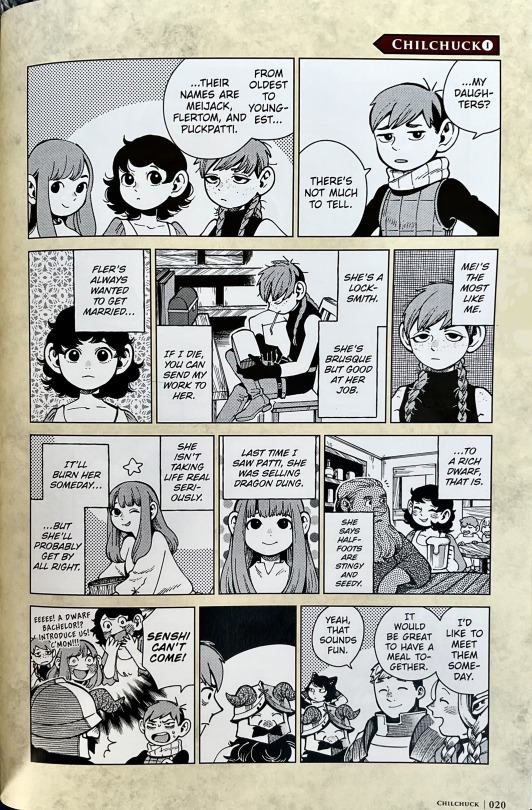
Meijack is the most capable, takes after her father the most, seems to have her own business as a locksmith but has a stable steady life. Flertom is the most social, she works at a tavern which seems stable and is ambitious with marriage plans, she has a caring side to her since she sent her dad a handmade gift. Puckpatti is the most upbeat, though she has the most unstable lifestyle, seemingly doing odd jobs.
His daughters do seem well adjusted, which encourages me in that their family seems amicable on the whole and (at the very least) decently functional. We don’t hear what they think of Chilchuck but presumably none of them are on bad terms with him or each other. Flertom does say that "half-foot men are stingy" which, gee, I wonder what half-foot man would have made taught her that- though it does also seem to be a racial stereotype in general, with how for example Namari also says to "steer clear from stores with half-foot clerks".
Flertom seems to be the only one who reached out after their mother left (the only one who's mentioned to have done so at least), and it's because she was the one who took in her mother. It’s not implied that they exchange letters regularly too iirc, it possibly was the only letter they've exchanged since then. I wonder if the daughters even know the full story, if their mother told them all about it or very little. Maybe some are pretty out of the loop, or more distant.
It strikes me that they don't seem to be very close. We're not shown anything that leads us to believe they don't like their father, but I think they're so used to him being absent for work that such distance is normal for them and they don't really long for a deeper relationship or to see him often. They were already out of the house and it seems like they didn't see each other much at that time either so for them it would be just a bit less than the regular amount of Dad time. It's been 4 years Chilchuck what are you doing... But yeah! From what we see they seem mostly unaffected, almost indifferent, not that we can truly tell. I imagine Flertom is the one most attached to Chilchuck with how she sent him a handmade cowl, and I think he rubbed off the most on Meijack teachings wise (besides her attitude, she’s also the one who still wears braids, and we see that Chilchuck braids hair). It makes sense, since they're oldest, and on the contrary I think Puckpatti is the one that knows her father the least. It'd fit the timeline with him working away more while she grew up imo.
Wouldn't it be interesting then that she's the one that Chilchuck says is carefree, in the official translation "doesn't treat life real seriously"? That she's the most optimistic, the most go-with-the-flow, out of the bunch? To me that sounds like a result from her being the youngest and Chil being the most often at work, thus her getting raised by her mother without as much involvement from Chil. Far be it from me to say Chilchuck would raise his daughters to be unhappy btw, not at all, we just all know what down-to-earth values he wants others to have so he doesn't have to worry about them.
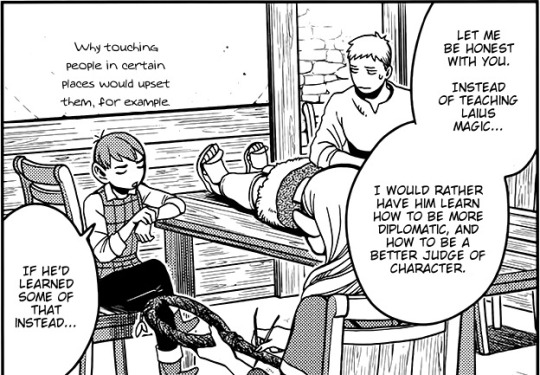
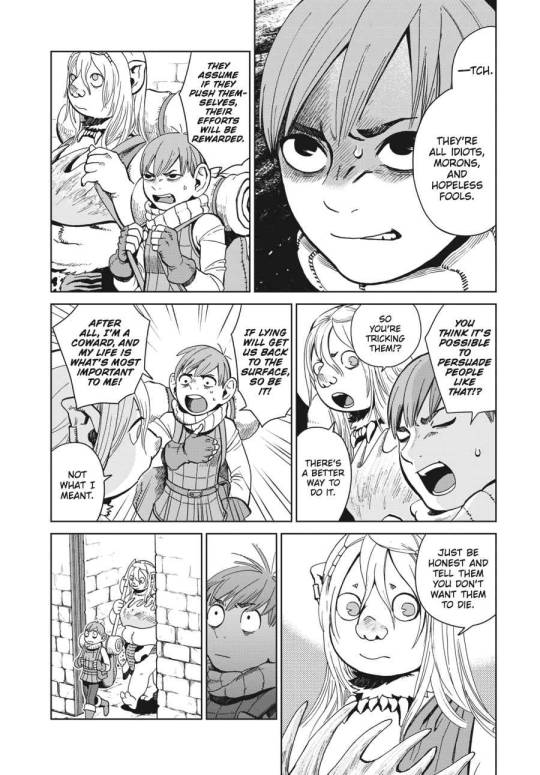
Although… Puckpatti spotted?? Seems like he wants to stop her from buying something? His heart meter for her is full <3 (Note: I’ve seen it be argued that this could be his wife. I disagree, since the "stop them" and way that the long haired one is off-center compared to everyone else gives the sense that it’s many of his daughters, and the fact that it’s styled after a dating sim doesn’t mean it’s romantic love as we see with the others. Otherwise imagine being her wife and he tells you not to buy stuff when you go shopping together rip)
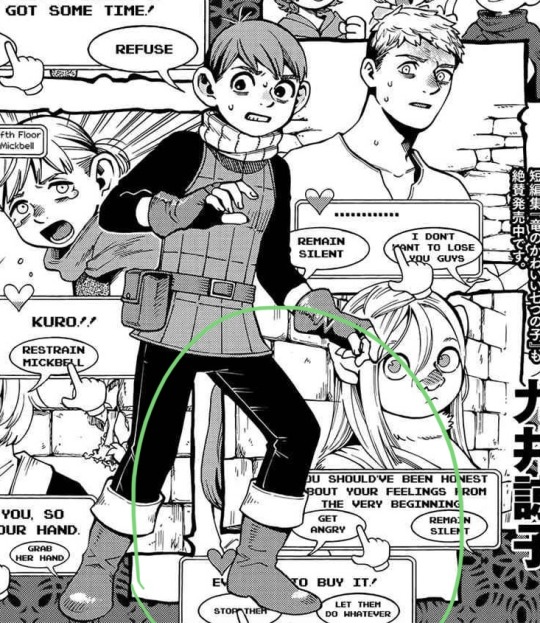
Headcanons time:
When naming the daughters, together they choose a pool of names they’d like but only one has the final say, and they alternate between who that is. Chilchuck sticks around more near the end of her pregnancies, and he hasn’t missed any of their births. I don’t have any opinions on who named who right now, but there could be some interesting stuff to theorize with Puckpatti, like them taking extra care picking the name together because they settled on her being their last daughter for fluff, or it was supposed to be Chilchuck but he was so busy that he ended up not picking in time and she was the one to name her for angst.
Actually scratch that I have a new theory : What if it’s actually customary for each parent to pick one half of their half-foot kid’s name? So then each would have chosen half of each girl’s name… And this could be why Chil calls Puckpatti Patti instead of Puck which is her first name, because he’s stubborn since Patti was his pick lmaoooo. Pattipuck doesn’t have the same ring to it alas, his wife was so right
Chilchuck liked to do activities with the girls when they were young. He's not opposed to relaxing at home with them perse, but he likes to do workshops with stuff like arts & crafts to develop their agility some. I don't think they'd do much outings to places like restaurants or theatres for money reason, and I don't think Chilchuck is much of an outdoors type, but he could accompany them to nice fields to play in, or in winter places to play in snow and sled, and organize some activities at home. He's not home very often so when he is he likes to take it easy as a break from work and values the time he gets with his family.
Chilchuck would sometimes work from home as a locksmith, say, unlocking a chest for a customer. In those times, Meijack would take interest and watch him work, even handing him the tools he needs as he goes. In this way, Chilchuck taught her a lot about the work of a locksmith over time. He's also the one that would oil door hinges or do renovation around the house- when he's available.
Like the plushies under his table in his home that we see in illustrations, Chilchuck has a lot of mementos from his daughter (and his wife) he keeps around. Sometimes they take a bothersome amount of place, but throwing anything out isn't something he's seriously willing to consider. Flertom's the most artistic and she used to help with sewing clothes back together, so he has a cheap ceramic mug painted by her when she was really young and small embroideries around.
Imo Meijack would be the most distant in the present. Flertom makes efforts for her parents and is pretty involved, and Puckpatti's distance is more out of being a bit airheaded and being busy + not having a great grasp on time or what's a normal amount of family contact, but Meijack's the one who knowingly and intentionally keeps some distance. I think she’d be the least optimistic about their family situation, and although she’d be hopeful when Chilchuck reached out to them again she’d be a but hesitant. I think Meijack would hold some grudges, being the one most critical of their parenting, both grateful to her dad for working so hard for them and saddened that he wasn't in their life more. Since Flertom was born in the same year I think it’s possible that Meijack was pushed aside a bit to take care of the younger baby more, out of necessity rather than lack of love. Her mom probably needed a lot of help around the house too. Flertom wasn’t blind either, and she cared about & noticed her mom’s emotional states, but she’s on the whole more hopeful and forgiving.
This is my most far fetched one but it is a hc after all, but I think it'd be interesting if one of them had food hoarding tendencies/stress. I like to think it's Flertom, because she's the middle child and would get told that her older sister and younger sister are "growing and need the food" so she wouldn't be allowed to take as much refill or such, add that to them not having much money to frivolously spend on food and that makes a kid who's worried about not eating to her hunger and tends to be possessive over food (I'm projecting). Differential treatment is inevitable in families with many siblings, and it can manifest in small or big ways, maybe they realize it maybe they don't. Working in a tavern has helped eased that tendency of her though, and while she does diet a bit she always leaves a meal feeling satisfied.
When they were younger, Flertom was a real firecracker, loud and spirited with some troublemaking tendencies! She was the daughter that got in trouble & got scolded the most. You can still see slivers of it now that she’s an adult, but she’s much more poised and diligent. She has much more acquaintances than friends, but she has a couple of best friends and usually gets along well with most people. Puckpatti was always a bit head in the cloud, very kind if not gullible, and tended to make friends somewhat easily but didn’t keep them for long, preferring to keep meeting new people and not keeping in touch well. She isn’t super talkative but tends to ramble when she does. Meijack is very introverted, she has more trouble making friends, she has a good handful though they don’t meet up often, her friendships tend to last and she’s close to them. She’s grown more confident over the years, less repressed and more quiet. Meijack as the big sister tended to be the listener for her younger sisters who had more social mishaps. Flertom has dated once before and it only cemented to her that she was going to have very high standards from then on.
Meijack wears thigh-high boots because she hates when sand, dirt or snow gets in her shoes. She wears practical clothing but avoids anything frilly or flashy. Puckpatti also dresses practically, but she does enjoy pretty clothes, it’s more out of necessity and due to not having enough money to indulge. Flertom has a social stable job and she loves prettying herself up (especially as she’s in search of a husband) so she’s the one who gets the most and nicest fashionable clothes and accessories.
Chilchuck is hinted to have had a rather dysfunctional family himself (alcoholic father, distant siblings, etc). So he doesn’t really have the best model on how to raise someone and such. I imagine it was a sort of neglectful home situation, where the kids are encouraged to be independent. If they didn’t have to work or help around much, then free range parenting sort of thing. We do see how the family has full and warm feasts, where someone cleans his mouth with a rag, so it’s not like he didn’t have a caring circle or a tragic childhood though! I don’t remember if it’s explicitely stated, but he’s heavily implied to having grown up poor, as most half-foots, and I just think it's the hardened hardworking family type of childhood where just like he does with others they instill somewhat harsh life lessons in him, which in turn encourages him to indulge in the simple pleasures of life like alcohol and sex, or at least women’s beauty and crass jokes. We do see he seems more optimistic when he's younger in flashbacks, so a bunch of his harsh view on the world is still likely learned and earned rather than taught. I still think he inherited many flawed views from how his father acted, like his attitude about excessive drinking not being a big deal and worth it. That work hard play hard, enjoy life die young mentality he has, shown mostly in the "alcohol" section of his Adventurer's Bible profile, could very well be partly a result of the general poverty half-foot communities are that he grew in as well, like how he doesn't hope for things to be as best as they could be and contends with good enough. As far as I remember, his mother is never mentioned, but I doubt it implies she was out of the picture. She was probably a regular sort of mother that took care of the home as well and was still around when his father died. It looks like there’s a good age gap between one sibling to the next, that could be interesting to dig into too.
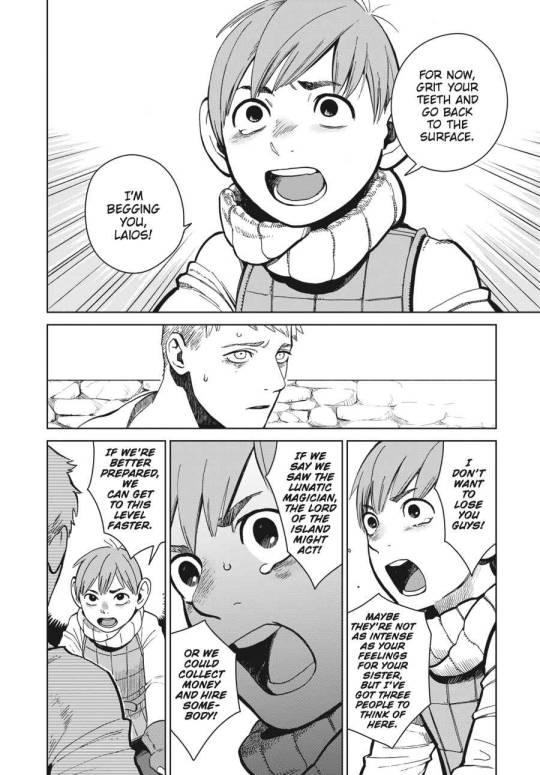
A part of Chilchuck’s character is that he takes responsibility for safety and actions of people around him and is very often looking out for them to not do faux-pas wether socially or literally with stepping onto traps. The way he says "I’ve got three people to think of here" makes me think that’s also how he’d think about having to provide for his family, and that could be a source of stress and insecurity for him. Caring for others is a pretty integral part of his character and we see time and time again that his family is very important to him, in any case.
Post-canon
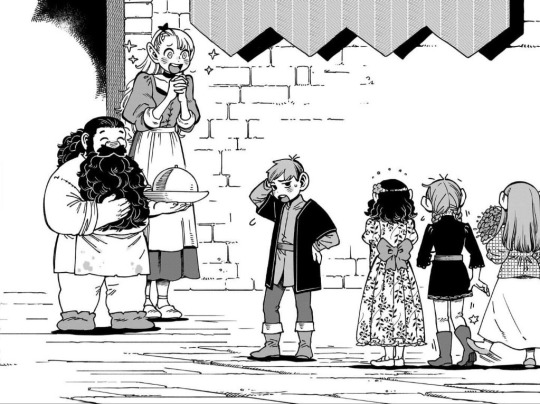
This pic has so much to say!! It’s the ‘thank you for reading’ double page spread where they’re going to a big dining table at the castle with Laios and the main gang. First family gathering in 4 years perhaps?! I’ll say, not feeling very hopeful that his wife isn’t in this, not even implied to be just off-panel with a hand or anything… I imagine before this he still talked to them at least a bit and figured their family situation out, but I think this is still in the early stages of reconnecting. Haha imagine being one of them and receiving a letter saying "Hi it’s been a while… I want to introduce you to my ex-coworker the king and his friends, you up for that?" I don’t want to reconsider all my hcs for this yet, but this pic does seemingly show an eagerness from all the daughters to reunite and reconnect! Meijack’s could be seen as more hesitant, but I think it’s just awkwardness from meeting so many new people, of high status no less. Chilchuck does seem awkward and somewhat self-conscious though, and while that could be just from say Marcille and the others meeting his daughters and him not knowing how to act, I think that also shows that Chilchuck is unsure how to act around his daughters too. Can’t blame him, I’d be stressed too. Anyways, the daughters are all dressed up! Puckpatti even brought flowers! And I doubt it’s just for Senshi, or just to be in with the king. Oh also also, Puckpatti chides Meijack here, seemingly on manners?, so that implies new/different family dynamics there~
We know with the succubus chapter that he does plan on reaching out to his wife again and shooting his shot, and when Marcille was dungeon lord he told her she could help think of a plan to make up with her together at which point Marcille showered him in gifts and flowers intended for her and his daughters. So we do know that whatever happens and however it happens, Chilchuck definitely will at least reach out to her to win her back or worse case scenario get closure on the situation.
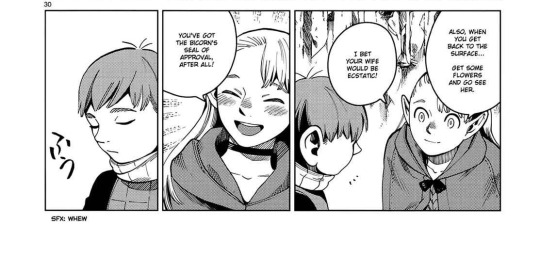
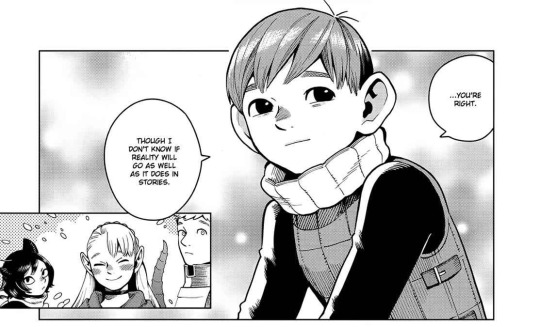
-
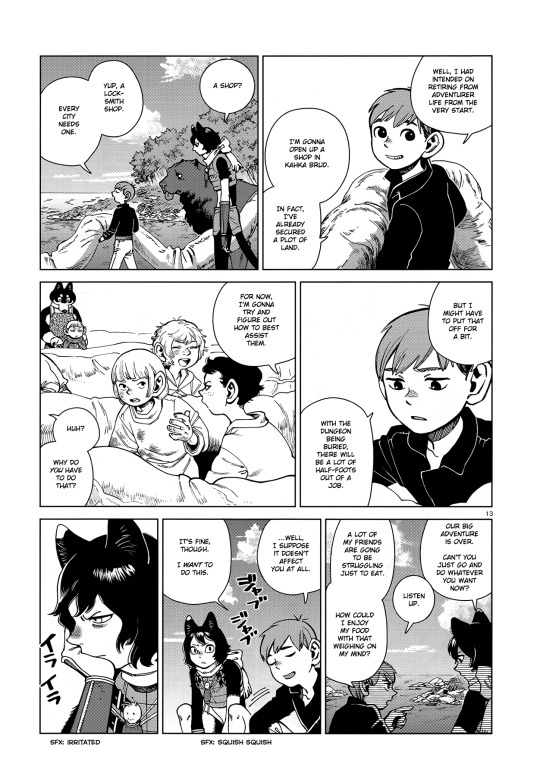
These are his plans before it’s revealed that the Island is… Well, not an island but the golden kingdom, so the news that Laios is king and that might have changed them a bit, but I think he’s still gonna stick around to help with the half-foot guild for a while.
My personal ideal post-canon Chilchuck life is that after around a year or two of helping around in the golden kingdom, especially regarding half-foot working rights, he gets his shop and finally settles down. He prioritized the whole half-foot guild because there are changes to attend to and people to help, but also used that to procrastinate a bit on getting in touch with his wife again. He does send a letter though, and when she replies they then meet face to face. They explain how it was like on their end, their grievances and their feelings, and they do reconcile. But… It’s been 4 years and his wife has frankly moved on. She’d rather they stay as friends, and Chilchuck has mixed feelings on it but is ultimately fine with it. He was halfway resigned to not reconciling with his wife in canon after all. But no longer do they have cut contact! They get together with the girls for the holidays and the ambiance is nice! He starts exchanging letters more regularly. He also gets a second family of clingy asses with Izutsumi and the main gang and so though he lives alone in his shop he’s well surrounded and well loved, and his daughters visit to check up on him every so often.
I really like the… Maturity of Chilchuck’s plotline, if that makes sense? To me the ending that fits the most is him and his wife reconciling, but not getting back together. I like that they could still be adults about it and at least amicable even after divorce, and that that wouldn’t be treated as a tragic ending. In the end, they were childhood friends and teenage parents, they rushed things a bit and I genuinely think they’re just not that compatible. If not then, at least having it be a gradual process, getting back together and making it work until they’re truly comforatble with each other. Destroy the relationship to better build it again stronger!
Although, his arc in the manga is to allow himself to form connections and be optimistic, which would fit well with him and his wife getting back together. I def think Chil would get healthier post-canon which could fix the issues they had in their relationship though. Like for one he starts eating more, which improves mood & irritability & health, and also after the whole half-foot guild he plans to settle down with a shop so it wouldn’t be long distance or unstable anymore which would definitely give his wife some peace of mind. If they still do some long distance at first while he gets the half-foot guild stable, it’d be really cute if he sent pressed flowers with his letters to her… That could make a nice fic concept, like over time all the pressed flowers and exchanged letters hehe (oh shit that’s a nice title)
My post-canon timeline is Chilchuck lives a nice life living alone in his house except his friends all visit him and care and even tho he likes living alone it’s also bittersweet and every corner of his life is haunted by mementos of the ones he loves and the moments he had with them. But then it’s also like the shared duty of everyone to pass by his shop when they can and keep the old man company and sometimes that means many people come at the same time like if both Meijack and Marcille came the same day~ Cozy life, no regrets except a lil regrets still. That’s it that’s all I want.
Misc
I didn’t know where to put this, so new category time! Family truly is a central theme of Chilchuck’s character. His reaction to learning more about how life gets made is so awed by the wonder of the world. Life indeed…
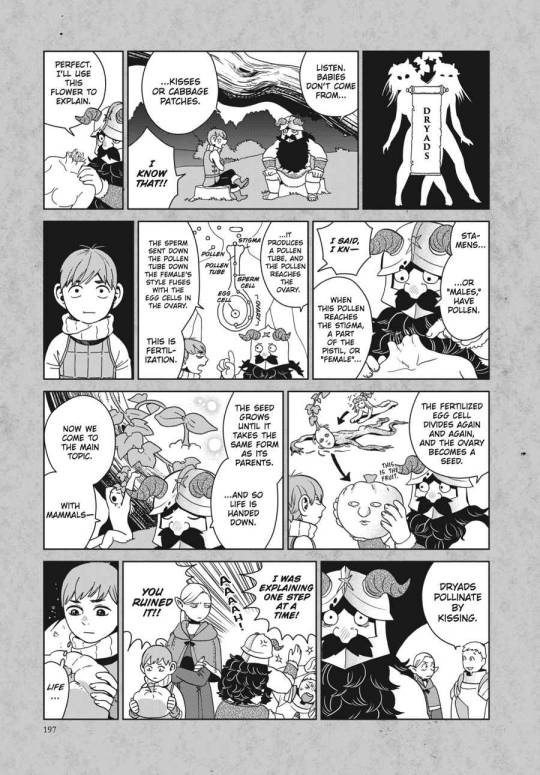
The implication of this page is that Chil didn’t know about the science side of how procreation works, though of course he did know about the practical side of it. This is speculation, and we have no clue how widespread the information of how reproduction scientifically works lol, but I think it’s fair to think that half-foots’ education especially in smaller communities is handled by the parent, school of life style, or if there are schools then the education is very general and it probably ends early. I think this is supported by how for example half-foots’ jobs we’ve seen are based on experience rather than knowledge, like being a locksmith. Of course any job has its fair share of specialized knowledge to learn, but jobs you learn on the fly pretty well. This sort of dynamic contrasts a lot against elves many tallmen communities, like with the magic academy, where education and knowledge are valued almost above experience, this is what the mandrake chapter was all about after all. Poorer communities tend to have poorer education systems as well irl, it’s a whole issue.
So I already said my piece about his wife not being blonde and it being nice and romantic because literally you don’t need someone to be a beauty ideal to love them and that’s fine and normal and even more romantic imo. But!! I do have an headcanon, now that his wife’s appearance is all but explicitly confirmed. While their hair is blonde, yes their hair is wavy and the ‘main’ one has deep-set eyes, not unlike his wife! Now this is a ‘which came first the egg or the chicken’ question, but while most people seem to be assuming that he got with his wife because she was his type, since they’re childhood friends I feel like it’s his love for his wife that shaped his preferences in that deparment. Like ok he loves golden hair and hers is black, but isn’t it so much more romantic that he has so much love and devotion for his wife and has stared lovingly at it so much over the years, that it’d become his ideal? He loves her eyes <3
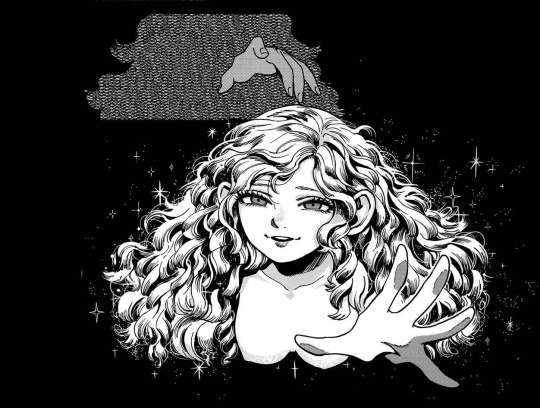
Conclusion
Reminder that I’ve got more observations and tidbits compiled in a reblog addition now.
More stuff I should workshop for the masterpost:
Compile more info on Chilchuck's father and his other family. Edit: I compiled all I had pretty neatly here in a speculation post, but there’s no other concrete piece of info other than what I’ve covered here sadly. Same with stuff like Chilchuck’s past work schedule and exchanged letters, there seems to be no other bits of evidence, except…
On the chapter cover and extra where he’s in his basement room we can see one letter and a few papers across his desk. Maybe family letters? Wether his daughters or relatives. Seems too few to me, could just as well be job descriptions, but truly who knows, it’s hopeful.
Excellent analysis on half-foot culture here by a friend that I should read and incorporate the good info into my own meta~
And thus I leave you with a lil web weaving I made about Chil & his wife’s relationship~ And this is where I’d put panels of Chilchuck’s wife… IF THERE WERE ANY
Should we even call Chilchuck's wife Mrs. Tims... We don't know dunmeshi marrital traditions though, and half-foot already have somewhat complex naming conventions... I hate that we don't really know if the daughters' last names are Chils or Chilz. Although that seems to be a japanese to english translation issue, since japanese used the suffix zu and not su, likely to imitate the english S sound at the end of a word. Oh yeah the last names change each generation, that’s odd right? But in english it sounds like saying Chil’s, like, [father]’s, so I think this also supports how half-foots communities tend to be tightly knit and live in the present, for them to be like "Ooh so you’re [father]’s little one eh? I know who that is and this is insightful as to who your family is to me!". Iceland’s a place where last names are like this, though I don’t know about pros and cons of it in that context. It’s called a patronymic.
Ah and I have a bittersweet spotify playlist about her and Chil too, here if ya want. That’s it the post is over
#dungeon meshi#dungeon meshi manga spoilers#spoilers#chilchuck tims#delicious in dungeon#chilchuck’s wife#chilchuck’s family#Tims family#puckpatti#meijack#flertom#Analysis#Meta#Despite my best tries I am not omnipresent it's always fun when piecing together these topics is a community effort!!#please do build upon this if you have anything to add#but yeah editing is up in the air. I'll probably be adding stuff maybe even cutting stuff out#this is a giant post i am slightly overwhelmed#Kui puts so much importance in details it's incredible. It truly feels worthwhile to get into the weeds#We support chilchuck’s wife on this blog#I covered how stressful her life could have been a bit in my Grind Me Down Sweetly fic funnily enough if ya want to give it a read. It has#Daughters mentions too hehe. And my post-canon marchil take#Oh also if there’s already theory and compilation posts out there about this i’m down to link them in or smth. I haven’t seen it done but#If it’s been then i’m very interested in reading & seeing#Apparently chilchuck being an absent dad is a heated debated topic. Oops#Pls do not murder me… Peace and love in the dungeon meshi fandom? He’s my second fave have mercy on this humble stan#This is 7k words btw. Pls do pick and choose what you’re interested in or skim or take breaks or anything
687 notes
·
View notes
Text
The TTPD Deep Dive (Part ?)
It’s no secret that I have a lot of Thoughts about The Tortured Poets Department and it has lived rent-free in my head since it came out earlier this year. I’m absolutely blown away by how underneath the chaos, it’s actually an exceptionally cohesive story and is probably the closest to a concept album Taylor has ever done.
There are so many themes that have stood out to me over the last five months, and there’s one in particular that I think not only drives the entire album, but ties into previous albums to help deepen understanding of it.
This is it, my fangirl magnum opus, my months of posts consolidated into one place. This is also my disclaimer that this is just my interpretation of the album, and my summary of the story it tells, and I don’t pretend to have any special insight or authority. I’m not saying I’m correct at all, do not take any of this as fact, it’s just what it sounds like to me, and these are my silly not-so-little thoughts about it.
(Under a cut because it’s way too long and involves discussion many may not care for or be sick of.)
Come one, come all, it's happening again (I'm thinking too hard about Taylor music)
The overarching theme in TTPD to me is: Grief. If you’re looking at TTPD as a story being told (instead of just as someone’s real life), the inciting incident of TTPD is loss, and the grief from that loss is what drives the narrator’s actions and the fallout, as well as unpacks those complicated feelings and how they apply to the her life in general. By the end of the standard album, it’s also about recovering from that pain, moving on from it and learning from it.
The loss specifically is the loss of the dream of having a family (with one’s partner). One thing that is abundantly clear both on the top line and under the surface in TTPD is how Taylor (as a person and as narrator) longed not only to for marriage but specifically parenthood, and the fear and then realization of losing that chance absolutely wrecked her— which is why the next lover’s (the conman's) wooing worked so well, because it preyed on that yearning. Yet that loss also dovetails into the grief of many things: of youth, of idealism, of relationships, of ideas, even of self, which causes almost a deconstruction of a belief system to piece one’s life back together by the end.
THE CONTEXT
TTPD weaves in the topics of marriage and motherhood both explicitly and in the subtext, in various forms and scenarios. The cheating husband in “Fortnight.” The wedding ring line in “TTPD” the song. “He saw forever so he smashed it up” in “My Boy Only Breaks His Favorite Toys.” All of “So Long, London.” Running away with her wild boy in “But Daddy I Love Him,” fantasizing about weddings and joking about babies. The imaginary rings in “Fresh Out The Slammer.” The cheating husband (again) and the friends who smell like weed or “little babies” in “Florida!!!” “You and I go from one kiss to getting married,” “Talking rings and talking cradles,” and “our field of dreams engulfed in fire” in “loml.” (And arguably: “I wish I could un-recall how we almost had it all.”) “He said he’d love me all his life, but that life was too short,” in “I Can Do It With A Broken Heart.” They may not sound like much on their own, but they paint a picture about how the topics pervaded her thoughts and her writing, and in many cases express her desires, and her pain.
It’s something that goes back several albums when you pick up on context clues. You get the first hints on Reputation with “New Year’s Day,” and “you and me forevermore.” Then Lover is very forward with it: “Lover” is basically wedding vows, “Paper Rings” is very engagement-coded, “I Think He Knows” is cheeky but low-key “you better put a ring on it,” “It’s Nice To Have A Friend” has wedding/marriage imagery in the last verse. As a self-professed diaristic writer, it’s the type of stuff one presumably doesn’t put out there unless those conversations have already happened, and she was very excited about it at the time it was released.
Then the pandemic happens and folklore comes out, and while there is still happy love there (“invisible string”), there are also the first indications that something has happened to put a halt to whatever future she once dreamed of (“hoax,” “the lakes”) and that she’s trying to reassure herself and him that it can still happen even if she’s scared it might not (“peace”). Notably, as far as I can remember it’s the first time Taylor explicitly brings up the idea of family (with her partner) with “you know that I’d give you my wild, give you a child,” which stood out at the time because it’s so incredibly vulnerable, but it’s even more poignant when you really take in that the whole song is like a confession of her deepest worries, and this is her vowing to give him these things that she holds most sacred if he’ll let her. These are what she cherishes most dearly and wants to return in kind: her youth and commitment (my wild), the family she craves (a child), unconditional support (swing for the fences/sit in the trenches) and understanding/compassion (silence that only comes when two people know each other).
Evermore follows an even darker path, and suddenly the album explores relationships that end and grappling with loss. There are toxic relationships (“tolerate it”), dangerous marriages (“no body, no crime,” “ivy”), failing/broken relationships (“Coney Island,” “champagne problems,” “happiness,” “‘tis the damn season”), as well as grief (“Marjorie,” “evermore”). Even some of the happy songs have uncertainty in them: in “willow” she’s begging for him to take her lead, like she’s still trying to decipher him and ask him to commit; in “cowboy like me,” still a beautiful love song, she’s thinking, “this wasn’t supposed to work and we were supposed to bail on each other but we fell in love instead”; “evermore” is about the depths of severe depression (and more) with the love story being the one saving grace in her darkest hour. And it’s also notable that after all the “fiction” writing, shortly after this album she writes “Renegade” where she’s telling the subject: I’m ready to start the next phase of our life now, why aren’t you? Is it me you don’t want after all? It’s like there’s something telling her that this stall might not just be a stall.
Midnights is a jumble (in a good, but in hindsight, also sad way) with the “sleepless nights” concept, but it seems pretty clear now that the themes and events and relationships she was revisiting tied into a lot of what she was feeling in her present life. I wrote the cliff notes version awhile back, but she’s questioning so much of her life that’s reflected in past events and relationships. Am I actually always the problem? How did we lose sight of each other and what we had? We only seem to work when we block out everyone and everything else. Can we ever go back to when things were good? Why are you neglecting me? I once thought I was going to lose everything but you saved me in the nick of time, can that happen again? I chased my career, but did I give up my chance at having a family in the process? Nobody knows what I really suffer from behind closed doors and I’m all alone.
And so on, which in retrospect now that we have TTPD, is very much what she was grappling with in private while writing and releasing the album. The inspiration behind the songs may have been different events and muses, but regardless of their origins they all end up feeling too familiar, like she's seen this film before (ahem). We’re seeing her view of commitment change too, or rather how she writes about it: she’s not making the outright declarations of it like on Lover, or even the implied ones on folklore, nor is she talking of the dark side of it like evermore. For the most part it’s a return to the early days of some relationships, before things got hard, or the end of them when there was nothing left, and also pushing away the discussion of it altogether by the outside world. “Sweet Nothing” is a sweet slice of life, but even at that, it’s the peace of the home in conflict with the pressure of the outside world. Now that we have “You’re Losing Me,” which was written at the same time as the rest of the album, we can probably deduce that she was going back to the start because something happened that made her doubt the future.
THE SETUP
So much of Midnights directly ties into TTPD, and I said in the post I linked that it’s like Midnights is asking the questions that TTPD answers. But there’s one song in particular on Midnights that sticks out to me as being key in the broadest sense to understanding the state of mind that led to the events of TTPD, and that’s “Bigger Than The Whole Sky,” because the way it expresses grief is reflected in the theme of mourning a life built and the dreams along with it that are never realized in TTPD. There are several instances in TTPD that are basically variations of: “every single thing to come has turned into ashes,” and that’s what makes her snap, and leaves her vulnerable to someone who promises her those things when she’s bereaved at losing them in the first place. (In other words: “the deflation of our dreaming leaving me bereft and reeling.”) The song tells a story about how that loss of hope colours one’s entire mindset, and in some ways is a bridge to TTPD to understand what such a low point feels like.
I think that that grief, and most importantly losing hope for an imagined future in its wake, is fundamental to understanding TTPD on so many levels: both the decline with one partner that kept her hanging on then led her such a dark path, and why she fell for the conman's apparent bullshitting because it offered an express pass to what she was losing with her partner. And I also feel like it plays a part into the ruminating she’s doing all over Midnights, trying to make sense of where she finds herself when she’s writing the album, which directly leads to “You’re Losing Me.” Loss permeates so many of the stories on Midnights: of lovers, of innocence, of youth, of faith, of control, of life’s work, etc. “BTTWS” is just one of the ways in which it is expressed so fully, capturing that deep depression and subsequent extinction of faith in something that once felt assured and very much wanted. (Which is also mentioned in her writing process in the “Depression” playlist on Apple Music.)
If you understand why that feeling of loss in general across so many parts of life is so important to Midnights, then it illuminates so much about the “narrative” in TTPD too. If on Midnights she’s wrestling with the seeds of grief and loss (on multiple fronts), TTPD is her reckoning with it in its full form. “So Long, London” is the song that is the most explicit about it: How much sad did you think I had in me? How much tragedy? Just how low did you think I’d go before I’d have to go be free? You swore that you loved me, but where were the clues? I died on the altar waiting for the proof. It’s the sequel to “You’re Losing Me.” It’s, the air is thick with loss and indecision, I know my pain is such an imposition, I’m getting tired even for a phoenix, all I did was bleed as I tried to be the bravest soldier, I’ve got nothing left to believe unless you’re choosing me, my heart won’t start anymore, but from the other side of the break.
This is highly speculative, but if you follow the thread about the topic and the relationship as told from Rep through TTPD, in broad strokes it goes: young love with a serious connection (Rep) -> growing up and making life plans (Lover) -> something happens that delays those plans or makes them grind to a halt (folklore) -> serious doubts arise and cause a loss of faith in their future (evermore) -> struggling with the loss of that future and trying to make sense of the problems in a last ditch attempt to save the relationship (Midnights) -> fallout from that grief after the blowup of the relationship (TTPD). Understanding that progression of events (through the music) explains not only the storytelling side of TTPD (e.g. the jump from the partner to the conman) but also how the experiences/muses blend in the music, and how the music that on the surface is about the short-term relationship is really driven by the destruction of the long-term one.
Following the music, it’s IMO implied that Taylor (the narrator) was holding out for marriage and family with her partner, for years, and it seems like it was at one point a shared dream until something happened to pump the brakes, and seemingly on her partner’s end. And extrapolating further, given how the sorrow expressed in former albums bleeds into TTPD, it sounds like a plan that had been concrete in some form before it had fallen apart, and losing something that once felt so tangible is what drives her in her grief to find any kind of respite from the pain. Which is why the situation with the conman becomes so appealing as the one with the partner splinters further and further.
(If everything you’ve once touched is sick with sadness and you don’t want to be sad anymore, what are you left to do?)
THE STORY
So (one part of) the story kind of sounds like this from the standard album: the relationship with her partner as well as his mental health slowly deteriorate and he withdraws emotionally (“London,” “Fresh Out The Slammer”) and physically (again, “London,” and “Guilty As Sin?”) and takes his resentment out on her (“London” and arguably “My Boy Only Breaks His Favorite Toys” even though I don't want to get into muse speculation here). As she sinks deeper into her own depression as a result, the weight of the failing relationship starts feeling like a cage— or a noose (“London,” “Guilty”), but coming to terms with the loss of their life together and the future they’d dreamed of was killing her (again, “London,” but also “I Can Do It With A Broken Heart”).
Enter the conman who she reconnects with at the very point where this is coming to a head (knowing that IRL she reconnected with him around the time Midnights was being worked on) , and if you read between the lines, she confides some deeply personal things to him (“Down Bad” and “hostile takes overs”/“encounters closer and closer,” “Smallest Man” and the entire sleeper cell spy imagery which is one of my favourite things and I could write a whole essay about the meaning of it, “loml” and “A con man sells a fool a get-love-quick scheme”). Then after she’s confided these secrets to him, he insinuates himself back into her life (“Guilty,” “Down Bad,” “Smallest Man”) and sells her a dream that HE can give her all these things she hopes for (again, “Down Bad,” “Smallest Man,” “loml,” song “TTPD,” “Broken Heart”).
But the thing is, he only knows these are the things she wants because she’s revealed it to him, and presumably, told him that was what she was losing by staying with her partner. And instead of the normal response of, “that is really sad that your partner is not supporting you and you deserve to be treated better,” to a friend in growing distress, it seems like it was, “well I can give you all those things!!!! Right now!!!! Trust me!!!!” And worked on her until she believed it, and jumped at the chance at a precarious time in her life. And one thing I want to underscore is: Taylor has agency in the situation always, it’s not like she’s been kidnapped and brainwashed. (In fact, she implores on songs like “But Daddy” that SHE is in charge of her own choices, good or bad.) She chose to rekindle the friendship and then relationship, and she chose to eventually leave her long term relationship for another man, and she reiterates on the album that she owns this all. But it’s also: nothing exists in a vacuum, and she makes choices based on emotions and information she has at the time, which is why it gives so much whiplash.
THE ALBUM
When you look at it as, the situation with the conman only happens because of what happened with the partner first and that the appeal of the conman and the fantasy he sells her is a direct reaction to that, it makes the “swirliness” of the music make so much more sense. And for much of it, even many of the “conman” songs on the surface are really “partner” songs underneath.
Fortnight
A suburban gothic allegory about a broken marriage with a distant husband with a wandering eye, which makes the rekindled romance with the neighbor so appealing. She’s miserable caged in her stifling house because she’s been abandoned by her spouse, so the reappearance of this past love reignites the passion that’s dead at home.
TTPD
“So tell me, who else is gonna know me?” “I chose this cyclone with you.” I’m gonna kill myself if you ever leave. Everyone knows we’re crazy. She’s laying it out there that she’s already in a dangerous state of mind, and she’s actively putting herself in more danger by pursuing the conman. “At dinner you take my ring off my middle finger and put it on the one people put wedding rings on, and that’s the closest I’ve come to my heart exploding,” spells this whole thing out so clearly: whether it’s an actual event (likely) or a metaphor for the promise he makes to her, the reason why it makes her heart explode is because it’s the thing she’s been waiting for forever with no movement, and here this person comes in and slips it on her finger in an instant like it’s nothing. (And eventually, as we’ll come to know, it is absolutely nothing to him.) You mean it could have been this easy this whole time?! (Well, no. Not until a certain other suitor makes his appearance later.) It feels like she’s finally getting everything she wanted in the blink of an eye! How lucky! How convenient! What was that about the get-love-quick scheme you say? (Unsaid: the reason why this feels so urgent is because there’s a sense that time is running out in so many aspects of her life and not just the obvious. Which reappears later on.)
Down Bad
“Did you really beam me up in a cloud of sparkling dust just to do experiments on?” sets the scene for this euphoric experience in the moment that starts to feel violating once the dust settles (which is then followed up in “Smallest Man” and the spy mission on her). The bridge spells out how he weaselled his way into her life, preyed upon (intentionally or not) her emotional state, sold her a dream and then vanished, without the benefit of hindsight yet we see later in the album.
The alien abduction metaphor is pretty brilliant, because it shows both how she was desperate to escape the place she found herself in, and how much it screwed her brain to then be left stranded when the affair was over. “[I loved your] hostile takeovers, encounters closer and closer,” is so evocative because it details how the situation came to be: his overtures under the guise of friendship blurred lines until he made her an offer that she eventually couldn’t refuse (hostile takeovers) as he infiltrated her life more and more intimately. The sad thing is that the song has parallels to how her relationship with the partner started too in earlier albums, in that they ran away to live in their own bubble (or planet) only for him to metaphorically abandon her as the years went on. (Oven, meet microwave.)
My Boy Only Breaks His Favorite Toys
Being continually emotionally broken down by a person who knows he’s hurting you but still acts the way he does. (The original voice memo version makes this even clearer and it’s rather heartbreaking.) “He saw forever so he smashed it up,” speaks to the loss of a future the person became scared of, and the original lyrics (“he saw forever so he blew it up”) somehow cut even deeper to me because it feels so much more intentional.
Also in the original version, “he was my best friend and that was the worst part,” also speaks not only to the loss of an entire partnership in the wake of this hurt, but also to the feelings of betrayal that the person you trust so deeply has the ability to hurt you in this way too, and how it’s a one-two punch of not only losing the relationship but also your closest confidant. (It’s like the sequel to “Renegade” and the missiles firing to me.) Again, there are shades of both/many situations in the song, pointing to an unfortunate pattern in some ways. The situation in “My Boy” is part of why she was so low, and why the “get love quick scheme” was so appealing later on. And it dovetails nicely into…
So Long, London
The most explicitly “partner” song that puts a coda on “You’re Losing Me,” and is Track 5 because it’s the emotional underpinning of how she got to where she was, and drives the events of the rest of the album. It spells everything out: He withdrew, she tried to fix it for both of them, eventually even that stopped working, he was oblivious to or minimized how badly she was suffering and his (in)actions couldn’t reassure her, he wouldn’t move forward on their future plans and stewed in his own struggles, she was spiralling out of control trying to hang on and ultimately felt like she was going to die if she didn’t leave.
But Daddy I Love Him
Like a direct reaction to “So Long, London” in that she breaks free from the death of one relationship and throws herself with reckless abandon to the next, fuck the haters. How dare you judge me, when the relationship you think I should have stayed in was killing me? (Dutiful daughter all the plans were laid. All you want is gray for me.) Fuck all of you, I’m going to choose whoever I want! (So what if I have a baby with HIM, huh?! I tried doing it the proper way and look where that got me so now we're back to square one) It’s again her imagining how wonderful and freeing this “wild boy” is going to be for her, and how wrong she’ll prove everyone. THIS TIME she definitely got it right. So what if she has to run away! So what if she scandalizes the whole town! They don’t know what she really wants or needs anyway! She’s the only one of her (hee-hee-hee) and she’s the only who gets to decides how this goes. (Because: she longs for control in a situation she’ll eventually realize she has little of it in, which we’ll find out is a recurring theme in her life.)
Fresh Out The Slammer
Also spells out what happened with the partner in the first verse and the pre-choruses, which is what makes the conman so appealing as the imagined jailbreak. The bitter loneliness vs. the sultry passion she builds up in her head as she awaits her release from prison is key to understanding the two sides of the story in the album. There’s this whole outlaw imagery (which is also carried through in “I Can Fix Him”), but it’s contrasted in the end with her and her reunited lover sitting on park swings like children with “imaginary rings” — because “Ain't no way I'm gonna screw up now that I know what's at stake.” What’s at stake is lasting love and the promises that come with it (marriage/family) that are precious and time-sensitive. The imaginary rings are both a nod to the youthful dreams of her and her new/old lover, but also has a double meaning to me because those promises aren’t built on anything together; they're made up, intangible. (They’re no more concrete than the plans that went up in smoke with the partner.) Like with most of the conman situation, it’s all a fantasy in her head that has yet to happen, and as we find out later in the album, reality ends up leaving much to be desired.
Florida!!!
Broadly speaking, it’s running away from your problems and wanting to disappear from your life. (But again: the life she’s disappearing from is the cheating husband she may or may not be feeding to the swamp-- another miserable marriage.) What kind of flies under the radar though is the “I don’t want to exist,” line, which points to her dire state of mind that led her to fleeing to that metaphorical timeshare down in Destin. In many ways about cheating death.
Guilty As Sin
Yes it’s the “masturbation song,” but again the nuance is that she’s left to pleasure herself because her partner has abandoned her emotionally and even physically, i.e. “my boredom’s bone deep.” To be blunt: they aren’t even intimate anymore, so she starts fantasizing about the guy she used to have chemistry with who’s reentered her life and is making moves on her. And realizing that she’s now finding release in another man (albeit imaginary) breaks her even as it reinvigorates her because she finally understands that the relationship she’s in is effectively dead. (“Am I allowed to cry?”)
Who’s Afraid of Little Old Me
This isn’t about relationships, but about society and its reaction to them in a general sense. But again, she’s left to stew in all this anger and hurt as she’s been abandoned at home, then abandoned by public opinion, and the public attack on her is part of the origin as well as the end of that story. The trauma inflicted upon her detailed in the song is the reason why she felt trapped in the first place, which led to the decisions she’s made and habits she’s leaned on ever since.
I Can Fix Him (No Really I Can)
This is one of the few songs that is the most completely conman-coded, and shows when the delusion finally breaks at the end of the song. She spends the whole song being like, “no really, I alone can make him better! You’ll see! I know he’s gross, but he’s mine! It’ll be fine I swear! You don’t know anything! Uuuuuum hmm wait actually what the fuck—“
Loml
Oof. THE song. Again the surface reading is about the “conman” who comes in and sells her the lie, but the pain is because all the dreams she writes about are HER dreams and implied that they were the dreams she built with her partner that the conman sold back to her. I could do a deeper dive on this but most of the song is applicable to both relationships, which not only shows the “swirliness” of her writing, but also how they both ultimately did the same thing to her in different shades.
The bridge and the last chorus are kind of fundamental to understanding it all, and her ending it with “you’re the loss of my life” is about, among other things, how falling for this trap blew up the life she built and dreamed of for good. (I could talk about this one forever.) “You shit-talked me under the table, talking rings and talking cradles” to “Our field of dreams engulfed in fire” is a hell of a line and progression, and again, indicative of what the real driving force behind the whole album is. The shit-talking is because he took her dreams (of marriage and children) and hyped it back up to her tenfold whether in a moment of his own delusion or for more nefarious reasons — much like how the man prior kept promising these things but never followed through, which left her vulnerable to someone who appeared to offer them enthusiastically. The field of dreams isn’t just the one with the conman, it’s the one with the longterm relationship she’d built the dream with in the first place, because the conman’s actions are part of the reason the LTR went up in smoke. (Not the reason for the rift, but the consequence of the final break.) And THAT is why it’s the loss of her life, so completely.
When she says “I wish I could un-recall how we almost had it all,” IMO it’s not just the fake future that the conman lures her into, but also (and perhaps mainly) the once-real one she had with her partner and the loss of which that made her susceptible to falling for the con in the first place. There’s honestly so much between the lines in this song that covers every theme and speaks to the grief of seeing the life she imagined slip away, slowly by the first man then annihilated by the second.
I Can Do It With a Broken Heart
The juxtaposition of “He said he’d love me all his life, but that life was too short” and “He said he’d love me for all time, but that time was quite short” sums it up to me (and parallels “loml”), because they are two different situations, but they cut her just the same. In the first, “that life” IMO was the life they’d built with the dreams that went along with it and it was too short because he never followed through, and in the second, the “time” was quite short because it was the frenzy of the whirlwind romance that fizzled as quickly as it began. The life that was too short led to the time that was quite short.
The Smallest Man Who Ever Lived
This is definitely THE conman song. The rage, the shame, the violation, it’s all in there. But the key to it is the bridge and the espionage imagery woven through it. A honeypot scheme is when spies target a mark and seduce them to gain their trust and their privileged information for their homeland. So her likening him to a sleeper cell spy who set her up just to mine her deepest secrets and use them against her is a heavy, loaded statement. And implied: that valuable information she unknowingly held were her longings of marriage and family (the aforementioned shit-talking about rings and cradles she never got to have), and more importantly, those dreams preceded him reentering her life and then beginning his mission on her.
The insinuation then is: she confesses these are her deepest wishes which are now seemingly unattainable in her current situation (e.g. with her partner) -> he convinces her HE will give them to her and make the dreams she pines for come true -> she falls for him and blows up her life to make it happen -> he gets what he wants (thrill of the chase/sex/the idea of her/whatever his intent was) -> he abandons her when he gets what he wants, or rather it isn’t what he wants or can handle -> she’s left a) all alone b) with dreams unfulfilled c) with no answers d) feeling used at having her most sacred wishes used against her.
Again, the song is unquestionably about the way the conman absolutely destroyed her, but he was able to do that because there was this thing she wanted more than anything, that was dying in her previous relationship, that he was able to prey upon to seduce her, then discarded her and her dreams as soon as it was inconvenient for him while absolutely hollowing her inside out. (And again: the devastating thing is that this also applies to other relationships she’s written about, in different ways.)
The Alchemy
Not about either the partner or the conman directly, but it (loosely) touches on her finding herself after the whole oven-to-microwave experience and opening herself up to life and love again. #GoodForHer
Clara Bow
This isn’t about the romantic relationships on the surface, but it is about how damaging the entertainment industry and public life are on women, and how women are only valued for their beauty as commodities until they can be discarded and destroyed in the process. Which I think plays into the circumstances that led her to make the decisions that she did years ago, and why she makes the ones she does now. (But also, being valued for physical traits and appeal for the male gaze brings us to…)
The Manuscript
The “original sin” that kicks off all of this. Again, at first light this isn’t about the partner or the conman, but the person it is about is the reason why she has made all the decisions she has ever since in relationships (and that’s Mr. Plaid Shirt Days from “All Too Well”). The realization that her first serious adult relationship is what cemented these patterns, and this view of herself and her worthiness in relationships, is profoundly sad. An older man who valued her for being so mature for her age and implying that the mature activities ahem associated with that were the performance benchmarks in her ability to carry a relationship, only to leave her, was earth shattering. She placed her faith in this person, but then the way he treated her changed her view of love and of herself.
She took his innuendo about “pushing strollers” as a sign of potential commitment, whereas he ultimately meant it as foreplay, and she was too young and naive to know the difference. So not only did she learn from that that this man (and men) didn’t view commitment and family the way she did and that it was something to be toyed with, but she also learned that her value to them among other things was sex. Imagine being an idealistic 20 year old and your boyfriend ten years your senior tells you, “if the sex is anywhere near as good as our dates have been, we’re going to be making babies before you know it,” (e.g. this is relationship is serious) and then he dumps you: does that imply that the sex was not in fact that good? (E.g. that you’re not worthy after all?)
No, obviously from this side of life, it’s because he was a commitment-phobic playboy, even if he did love her, but she couldn’t have known that at 20 and instead internalized that shame. But, it did send her on a path of how she approached sex and love and relationships for over a decade afterwards. And her coming to the realization that that first act of (perhaps unintentional) manipulation is what informed her actions thereafter helped her break the pattern. Her worth to men is not just sex, she has value and her hopes and dreams have value, she doesn’t have to change into a different person to please anyone, because if that is what they want, they won’t ever want her anyway.
It’s been described here on Tumblr by people more eloquent and astute than I as a song that encapsulates the album as this: one did it slow (partner), one did it fast (conman), and one did it first (first love)— and that is haunting. After years of men minimizing her dreams and desires, if not outright using them against her, she’s finally at the point where she can let it all go and move on for good. (There’s a whole other tangent about consent and shame and manipulation, but that’s an entirely different kind of discussion. But it is so devastatingly contrasted with “you said if we had been closer in age maybe it would have been fine, and that made me want to die.”)
THE SUMMATION
This is just my interpretation of it, but in going through the standard album, it feels pretty clear how cohesive the album is about a story of love and loss and grief, then reckoning with what caused it all in the first place that set a person on this path. It’s a formative experience at a young age that was traumatic and led to certain coping mechanisms and a shaping of one’s self-perception, as well as the reaction to external pressures that try to dictate behaviours and influence how one feels one deserves out of love which makes it harder to know when one absolutely deserves more and better. And leaves one struggling to cope with loss when there isn’t anything else to hold onto. Then in light of one’s life blowing up, learning to find oneself in the aftermath all over again.
On another tangent that is somewhat related to the theme of loss, the way she writes about the two main muses on the standard album also ties into how the situations converged to create absolute carnage on her emotional and mental well-being. With one situation, she’s talking about a concrete life that crumbles under the weight of their struggles; with the other, the entire thing is a fantasy that she builds up in her head, and when it comes to fruition it falls far, far short.
If you look at the “microwave” (conman) relationship, you realize that almost everything she writes about it happens before it actually becomes reality, and it’s mostly her imagining how great it’ll be, but with few exceptions, when she writes about what actually occurred, it doesn’t even come close to living up to her expectations. “Fortnight” is an imagined future where she escapes to Florida and his touch finally starts her stalled engine (ahem). “TTPD” is perhaps the most positive retelling of their time together, but even that implies he was better off stoned and when he sobered up he succumbed to his demons all over again, and more importantly she conveys how she also is in extreme distress, barely concealed by the veneer of being infatuated with him. (E.g. saying to that she’ll kill herself if he ever leaves her — the implication is that she is absolutely serious about it when she “felt seen.”) And that the warning bells are going off in her head, but she feels like this person is the only one she can be with (because they’re equally fucked up and the chaos he brings into her life makes her feel alive when she felt so close to death).
“Down Bad” is the most explicit about being in love, but she’s also left completely confused and disoriented by him disappearing, wondering if any of it was real and the seeds of violation creep into her consciousness (“did you really beam me up in a cloud of sparkling dust just to do experiments on?” “Waking up in blood.”). “But Daddy” is her imagining she can tell everyone to fuck off for telling her what to do with her life. “Fresh Out The Slammer” is her fantasizing about this man while feeling trapped in her relationship — but never in the song is she actually reunited with him; she’s using him as the projection of all the things she’ll make right after being wronged by her partner. “Guilty As Sin?” Is very obviously about her fantasizing about sleeping with him, but again it’s such a minefield for her because it hasn’t happened yet; they’ve only just reconnected. “I Can Fix Him” is the only song other than “TTPD” that shows them actually together, and it’s the one where she keeps saying, essentially, “I know he’s gross but I can rehabilitate him into an upstanding person, trust me,” until the mic drop at the end of the song where it finally hits her that no, she can’t, because this is who he is, not the person she’s built him up to be.
“Loml” is when it all comes crashing down, and the song emphasizes everything he did and told her, e.g. that she’s the love of his life, but she doesn’t return the sentiment in the song about their time together. Because now that it’s past tense, she knows it wasn’t actually love. (And says as much in the album epilogue poem.) “Broken Heart” is her reeling in the aftermath, but again, it’s “he said,” not “I loved.” And then there’s “The Smallest Man,” where she eviscerates him: he also pursued an idea of her but didn’t care much for the real her in front of him (who else is gonna know me?), he love bombed her only to hurt her (crushing her dreams), he was constantly stoned (and not just in the funny munchies kind of way), and he wasn’t even a good lover (despite the fantasy she’d created before). That last point is especially striking because she spent albums singing about the importance of and pleasure in (sexual) intimacy in the relationship with her partner (sometimes to both their own detriment) and how it was at times the only way they could connect, but in this case, the idea she hyped up and acted on in her head about this lover never panned out in practice. She spells it out in the epilogue: it wasn’t a love affair, it was a mutual manic phase.
In contrast, there’s a lot more tangible action in the “oven” (partner) parts of the album, showing how hard she tried to make the relationship work in real life instead of just in her head. All of “So Long, London” is her detailing how she tried to break through to him and support him, even when he rejected it and pushed her away, thinking she could carry them both until they ultimately sank, but she did it because she “loved this place for so long.” (The place? Not just the city, but the home and perhaps most importantly, him.) In “Slammer” she stayed with him even as things disintegrated for “one hour of sunshine.” (E.g. holding onto the rarer good times even as they were fewer and further between, hoping things would eventually turn around.) And like in “London,” she held on despite people in her life pleading with her that it was hurting her. (Which is also echoed in “Slammer.”) In “Guilty” her boredom is “bone deep” because the passion that once drove their relationship (and papered over their problems) has finally gone out too, so there’s nothing left to hold onto, leading to her fantasizing about the new suitor, which makes her realize her relationship has passed the point of no return. “Loml” is about the conman on the surface, but the undercurrent of all the things she says about him is that he was co-opting the dreams that she was clinging onto for dear life in the previous relationship, which is why the con is so painful; the field of dreams he sets ablaze isn’t just the fake painting he sold to her, but the original artifact (her life with her partner) too.
All the physical and emotional labour she puts into the relationship with her partner ends up reflected in the fantasizing she does in the one with the conman, which is why it is so confusing in the moment and so lethal when he leaves her without any answers. She wants to get married and start a family with her partner which keeps getting stalled; the conman mock-proposes which makes her think he’s immediately serious (“TTPD,” “loml”). She feels caged by having to hide with her partner and shrink herself; the conman promises he’ll stand by her side publicly and let her shine (“Smallest Man”). She sinks into a deep depression in her loneliness as the relationship with her partner careens off a cliff; the conman convinces her they’re meant for each other in a them-against-the-world way (“Down Bad”). The intimacy (in all senses of the word) in her relationship with her partner fizzles; the conman stokes the fire by sending her secret messages and reigniting passion (“Guilty”). She spent years trying to help her partner to no avail; the conman makes her think she has the power to reform him (“loml”). She feels misunderstood by her partner; the conman acts like he’s the (only) one who truly gets her (“TTPD,” “loml”).
In short: there’s nothing that the conman does or says that isn’t a direct response to what her partner did first, and it’s even worse because the conman knew how much her partner’s actions hurt her and he used that privileged information to paint a picture of what he could give her, but in doing so in some ways aimed at her heart with even deadlier accuracy. (I’ve likened it to him borrowing someone else’s life for his own joyride, until he crashes the rental car and flees the scene.) It’s why in the aftermath, the difference in emotions are so different: she feels nothing but rage and violation towards the conman for getting in her head and using her, whereas her feelings towards her partner are more complicated. There’s anger (at her lost youth and being taken for granted), but there’s also sorrow (at their lost life and future), disappointment (that he never could step up the way he’d promised or she’d needed), even compassion (towards his struggles) and a tiny measure of appreciation (for the good times they did share).
When you look at the bigger picture, the story the album paints is just so painfully normal. You have two people (Taylor and her partner) who once loved each other deeply, and despite warning signs early on telling them they have fundamentally different needs and ways of living their lives they fight like hell to make it work (the epilogue) until those warning signs become grenades that destroy their home (“My Boy,” “London,” “Slammer,” arguably “loml”). Having already been through at least one rough patch/break/breakup that she felt almost destroyed her (harkening back to Midnights on “You’re Losing Me,” “The Great War” and “Hits Different”), the final and fatal downward spiral of the relationship (“YLM,” “London”) and the grief over losing that future sends her into a tailspin, just at the time where a flame from the past (the conman) reenters her life and tells her all the things she’s been longing to hear and feel (“TTPD,” “Down Bad,” “Guilty,” “loml”) and, crucially, missing from the relationship that was once her entire life.
So in her panic, she falls prey to the (empty) promises of the past lover (“loml,” “Smallest Man”) and decides he’s actually what will save her from the free fall, because the alternative (that she will end up in a situation she doesn’t think she can survive) is too painful to bear. When she finally acts on these circumstances (leaves her partner/runs to the conman), she snaps, acting on pure emotion and adrenaline (“But Daddy”), but before she knows it, the new lover abandons her, and she’s left to reckon with the fallout of the episode and process everything that has happened (“Down Bad,” “loml”) — with the conman, with her partner, with the choices made in her adult life personally and professionally which leads her back to the moment she feels set her down that road at the start.
The TL;DR of this unintentionally long essay is that the reason the conman affair was so serious was precisely because it was meant to fulfill the promise of what was her life with her partner. To me, a large part of the story is that she projected that life onto the conman (or he projected her life back to her for his own purposes) because she wasn’t ready to deal with that massive grief and the life raft he offered felt like the only alternative to an even darker end. Whether the conman actually believed what he told her, or he went along with it or encouraged it because it served his purpose, we’ll never know, just like we’ll never know the finer details of what went on (nor should we). But no matter what, the album is just an extreme deep dive into all the ways grief can consume us, and whether it’s a long, drawn-out death or a sudden, inexplicable one, it can turn a person’s life into such a trainwreck that they act in ways unfathomable to even them, let alone the people around them. It can also unleash repressed trauma and mental illness that can crater your sense of self. And when those situations are compounded? It makes for a nearly impossible type of breakdown to unpack. (Which is why you might need a 31 song album to process it.)
#What if i told you I’m back lol#Time for me to finally just post the thing after it’s been sitting in my drafts for so long so I can rid myself of it lol#Writing letters addressed to the fire#the tortured poets department#Consider this a treat before Eras comes back for its swan song leg idk#Would you believe that as long as this is#i deleted quite a few chunks of it from the original draft i sent to a friend(s) in the interest of ~propriety~#Because they were a little too rambly and um— ~speculative~/personal/etc and we are flying too close to the sun#And i tried to be as tactful and more or less stick to things we can point to in the music and such#So hope people catch my drift lmao but also iykyk i guess#I have so many other themes I want to talk about but I never have any time#I have so much more i want to say and yet#wavesoutbeingtossed: The Anthology#Also if things get weird i will turn off reblogs/delete the post tbd#This is not an invitation to get into muse ranting or debate in my inbox and I ask that you please respect my boundaries :)#Midnights#lover#folklore#evermore
129 notes
·
View notes
Text
Obsessed with the fact that Franziska goes to America for the explicit purpose of kicking Phoenix’s ass in court and is immediately tasked with dealing with clown murder. Her pride is wounded, she feels like a joke, she’s been wrapped up in a literal and metaphorical circus, so she returns to Germany until the opportunity to salvage her lost pride arises. A year later she returns to America at her brother’s insistence— only for that same clown murder to immediately become relevant again. Can you give this bitch a break
#ace attorney#Franziska Von karma#welcome to the circus Franny#mod vex#I’m debating whether or not to start posting aa opinions and theories and thoughts#bc I have many. but also. I’m nervous.
906 notes
·
View notes
Text
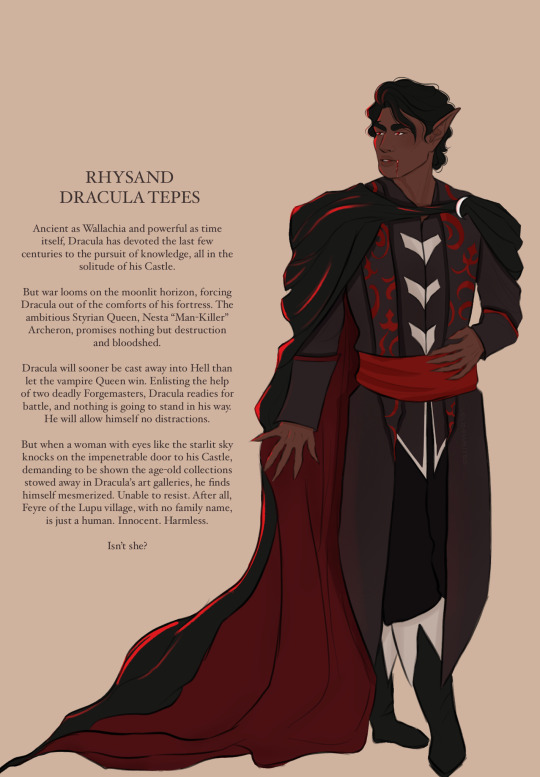
ACOTAR x Castlevania Character Sheets: Part 1/6
Rhysand “Dracula” Tepes 🩸🦇
Last year, @damedechance, @shadowisles-writes and I started watching Castlevania together and lives were changed. Today just so happens to be @damedechance’s birthday and I wanted to celebrate her by gifting her this AU! This is part 1/6 of this little story, and I hope you enjoy it just as much as I did making it.
Happy birthday, @damedechance!! I’m so lucky to call you my friend. You’re a beautiful person inside and out, and your talent knows no bounds. Everyone seeing this post is legally obligated to go wish her a happy birthday and report back to receive a smooch.
#i debated posting these all together but I think damedechance deserves to be celebrated for two weeks straight#I’ve been saving them for such a long time and I’m SO excited for you to finally see them!’#acotar au#rhysand#rhysand art#rhysand acotar#feysand#pro feysand#acotar#a court of thorns and roses#myart#velidedraws
169 notes
·
View notes
Text

If Eloise were in a different house, she would be a Gryffindor🫶🫶🫶
She might not be a stereotypically brave and reckless Gryffindor, but she is brave in her own, quiet way. She’s led by her emotions and her heart no matter how hard she tries not to be, and is unwaveringly loyal. Sometimes these impulses can lead to decisions she might regret in the future thoufh. And finally, when Eloise lets someone in, they are a part of her life forever🥺
#if you’re reading my fic she is NOT at a brave moment right now😔#but she’ll get there I promise…#i also kind of debated on Ravenclaw but she’s not like…#idk it just didn’t fit in my mind#plus the red looks so good and I’m just a simple girl🤭#I was too lazy to figure out texture overlay so here is my digital attempt 3 still smooth looking😆#also genderbent Eloise is literally just Leo#but I might draw him for tomorrow so he gets a post😆#hogwarts legacy#hogwarts legacy fanart#hphl#hogwarts legacy mc#hogwarts legacy oc#eloise babbit#mctober2024#oh also hufflepuff is like absolutely not 😆#tumblr killed the quality of this picture😌😌😌😌😌😌😌😌😌😌😌😌😌😌😌
78 notes
·
View notes
Text
ALARMING NEWS: GAY MEN STARE INTO EACHOTHERS EYES.
I don’t like them👍
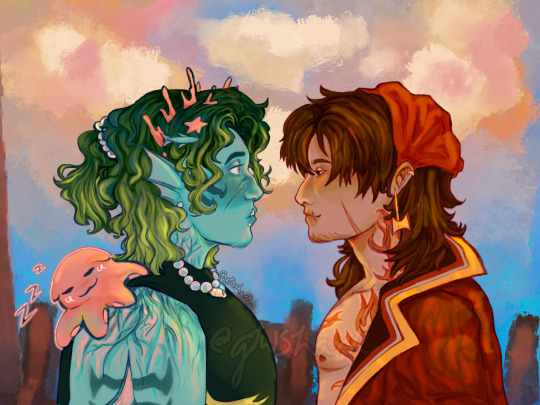


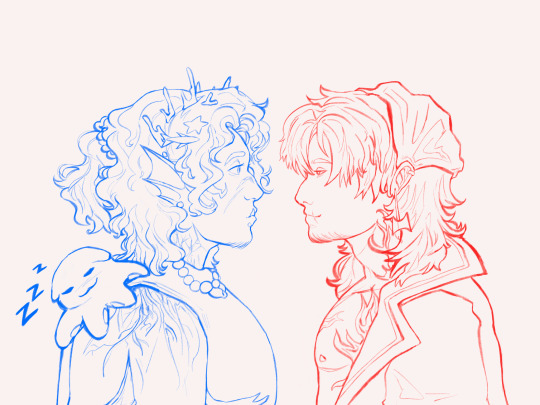
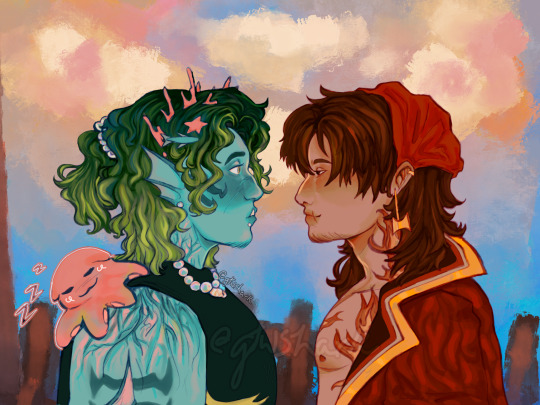
#was honestly fighting for my life debating whether or not to post this even though it took me Many hours#but I am a bit insane and still am very nit picky abt my art#but WHATEVER I’m sharing my insanity over THEM!!!IDC!!!!#I have nothing to say for myself#I miss them#head in hands#my art#mine#jrwi#jrwi riptide#fnc#jrwi fnc#fish and chips#gillion tidestrider#jrwi gillion#jrwi chip#chip jrwi#riptide pirates#AGHHHHHHHHH AHHH AHHH#whatever man
379 notes
·
View notes
Text
girl who can’t go for one minute without posting every thought that crosses her stream of consciousness on tumblr
187 notes
·
View notes
Note
Personally I think jily is supposed to be idealized (like how James and lily were idealized) to Harry. James gets knocked of his pedestal in swm and so does jily by Harry questioning if his father forced his mother into marriage. Later when talking to lupin and Sirius James and Jily get a slight defense and Harry is back to feeling alright but with the knowledge that things weren’t perfect.
I personally don’t read Jily as abusive (even though I read James as being abusive to snape at school, but I don’t think that violent, physical behavior was extended to Lily) but I definitely don’t read them as a “good” couple (whatever that means). I think you can read it in many different ways given there is so little of them and I think an interpretation that their relationship wasn’t the healthiest is perfectly plausible with the scant information we’re given.
Yeahhhh that’s probably what JKR intended. James and Lily are the fridged parents who are dearly mourned and missed, and as a result, their flaws are completely smoothed over in everyone’s memories. But in Snape’s Worst Memory, Harry learns the hard lesson that things aren’t always what they seem, and that nobody is perfect, not even his dead father. Hurrah.
My problem with this is that I think it’s very boring, LOL. Like it really is probably exactly what JKR intended (given her middle-of-the-road takes on every moral and political question that happens in these books), but man, it feels like such a cop out. James basically ruins Snape’s life for no reason, and the conclusion we’re meant to draw from this is just, well, people are complicated! NO!!!! Bad answer!!! Like, Snape also did some terrible things, but at least he spends a ton of pages actively suffering/atoning for his sins. But James, on the other hand, is only somewhat implied to have changed maybe slightly a little bit somewhere off-page, and we just have to take #1 James Potter fanboy Sirius Black and serial understater Remus Lupin at their word. So if James was supposed to be “redeemed” – or even just excused – wow, it really doesn't work for me. You can't go as dark as "protagonist questions if his father forced his mother into marriage" and then just brush it off like no big deal, Joanne! And it’s so frustrating, because all it would've taken to fix this would've been to show James being a good person instead of just telling the reader that he was one (proof: trust me?). Ugh.
So because of all that, I agree that from what we’re given, it’s quite difficult to read Jily as “good.” We rarely see them interact, and when we do, James’s behavior is wayyyy too similar to the trope of “terrible guy eventually gets the girl even though she seems to hate him with every fiber of her being because his persistence and not taking no for an answer is just toooo romantic to resist.” Which sucks, lol. It feels like JKR is basically being like, “eh, James was young and dumb, whatever” and giving him a huge out for all the grief he caused Snape (and Lily, for that matter) – and she expects that the reader will agree that that is a legitimate excuse for his behavior, and by extension think that it's reasonable for Lily to forgive and eventually marry him. And man, I am just not sure if that is enough to convince me. (And evidently, I'm not alone, considering the “Jily is abusive” meta post that likely sparked this ask!)
With that said, I agree that it’s a stretch to say that James was abusive (or even implied to be abusive) toward Lily. It’s not a completely unfounded take – it could probably be written well in a fic, and even be canon compliant – but you would really have to extrapolate that dynamic from the little information we’re given (as you pointed out). And more importantly (at least, re: that meta), I don't think JKR intended that interpretation at all.
Personally, I just don’t think it makes sense for the narrative for James and Lily to have been in an abusive relationship. And by the narrative, I mean Harry. If Jily is an abusive (or even just bad) relationship, that would have massive ramifications for the way Harry sees his parents. Ideally he would have to come to terms with that at some point – I don’t think it makes sense for James’s and Lily’s relationship to have been this way and not have significantly affected Harry – but imo JKR clearly does not want to deal with that. Like you said, the point of SWM – aside from foreshadowing Lily and Snape’s relationship – was to knock James off his pedestal and basically go, See, nobody’s perfect. <3 And the story is not interested in engaging with James’s behavior on a level any deeper than that lol. Which ok, I don’t love it, but if we’re not going to spend time dealing with morally gray James, then it doesn’t make sense for him to be even more morally gray (or rather, have him fall face first over the line into becoming a downright despicable person) by making him abusive toward Lily.
So that's my Doylist analysis: no way in hell did JKR intend Jily to be an abusive relationship, but she also didn't do a good enough job defending and/or redeeming James after SWM, so we're just left to speculate about how much he really changed. Still, I don't think "JKR is a bad writer" is a very satisfying answer. After all, the only reason that I'm engaging with this text in the first place is because I'm a fan of it, so I think it's also worth looking at it from a Watsonian perspective – or at least, to accept the events of the book as they're written and try to fill in the blanks. (Imo so much of the fun of fandom is trying to fill in those blanks in a satisfying way, to expand upon a character and try to reach a more interesting conclusion than the author did... And I would be remiss not to mention that, because it undoubtedly influences the way that I (and probably also you, if you're on this side of tumblr) engage with the text.)
So for me, as a Marauders era fan, I’m faced with: ok, I don’t really like the idea of these two characters together, but they canonically got together, and I think the story is better because they got together, and it’s better if they genuinely like each other, and it all had to happen somehow – so how can I explain it in a way that both makes sense with the story and is satisfying to me? And my answer to that is twofold.
First, I imagine that James was not always quite such an awful guy (as in, not always as showy, combative, and cruel as he was in SWM). After all, there is a glimmer of goodness in him when he chooses to save Snape’s life during the Prank, revealing that somewhere deep down, he does in fact have a moral compass. And second, I think that he has to have changed. And I mean a genuine change – one that might not have resulted in completely different behavior (after all, he was still hexing Snape through his seventh year) – but regardless, something that makes him seriously reflect on his actions and reconsider his motivations. His behavior in SWM is just too inexcusable for him to get with Lily – partly because Lily is generally framed as a Very Good Person, and partly because regardless of how she is framed, James was still awful to her – without any self-reflection or growth. Of course, the problem then becomes explaining this in a satisfying way!
And I have some ideas in mind – but they’re definitely more speculation than fact, and omg this post is long enough already. Luckily, I received another ask on this topic, so I will save my self-indulgent headcanons for that.
There is one last thing I want to mention, which is (part of) my reasoning for why James may not have been such a bully all the time and why I think he has the capacity for change, and it's been nagging at me ever since I read that meta post (which again, presumably started this whole thing). I think one thing that bothers a lot of people (including me!) about James is that it seems like he chooses to pick on Snape in SWM because of Lily’s presence. He wants to show off to her, so he keeps looking over to the girls by the water, he ruffles his hair, he deepens his voice, and he tries to get her attention by targeting Snape. Following this logic, we can presume that James wouldn’t have done any of this if Lily hadn’t been there – and that’s the part that got me thinking. I have to wonder if Lily was perhaps not the only person who James wanted to impress in that scene… in fact, I think it’s incredibly likely that James would have acted differently if the Marauders hadn’t been there! (Harry has "the distinct impression that Sirius was the only one for whom James would have stopped showing off," and Sirius saying that he's bored is the inciting incident for James spotting Snape...!) Yes it’s going to be a James masculinity analysis because this is what happens every time I talk about these fucking characters apparently. So idk, stick around if you’re into that.
And of course, thank you for the ask!
#i’m sure this was more than you bargained for lol but i hope this answer was satisfactory. it took me a whole week to write 😭#actually i guess it wasn't rly an answer because there wasn't rly a question. we're having high-minded debates in the literary salon lol#that said feel free to put more takes/opinions/questions/whatever in my ask box. i love to chitchat#asks#my posts#meta#hp meta#jily#james potter#lily evans#anti jily#pro jily#<- it really is both tho.#hp#hp fandom#hp marauders#marauders era#lily potter#harry potter#harry potter fandom#harry potter meta#the marauders era#marauders#marauders fandom#mwpp#wizarding world
95 notes
·
View notes